#like reading some playwright's first big play in decades
Explore tagged Tumblr posts
Text
just saw one of the weirdest movies today, on the request of my mom, because, "it's funny as hell". The movie was "Being John Malkovich" and she was right. it was one hell of a ride of a funny movie
#guess it helps my grandma and me both had “dark humor” and she helped explain it to me as a kid#this sorta veera on that but it's more absurdist and almost existentialist I guess#but even moreso it was just a funny weird movie that felt interesting throughout#like reading some playwright's first big play in decades#aghhtjournal#being john malkovich
10 notes
·
View notes
Text

Good morning! I hope you slept well and feel rested? Currently sitting at my desk, in my study, attired only in my blue towelling robe, enjoying my first cuppa of the day. Happy Hump Day!
Some guy asked me for my favourite musical era the other day. For me, no question: the seventies. I was born in 1959, so I was a child of the seventies. As a 12, 13, 14-year-old, that music hit me hard! Songs like ‘I’ll Take You There’ by The Staple Singers or ‘Daydreaming’ by Aretha Franklin still blow me away! So, as a child of the seventies and the son of a playwright, I was destined to be one of them arty-farty, hippy-dippy types; an incurable romantic and a hopeless idealist. Just like Timmy Thomas asked, I was always thinking, “Why can’t we live together?” The hippy in me wants to live in a huge house with family and friends. I like a big circle of friends and I like to spend time with my big circle of friends but, for some reason, people think I’m being ridiculous and unrealistic. Ultimately, it’s not a problem for me. People come in and out of your life. Some folk are season for a reason. Thankfully, wonderful new characters are always entering my life. So blessed to know so many good people!
I was doing my radio show at the Margate Soul Festival one year and Dr. Psycho passed behind me. “You’re playing the wrong mix!” he whispered in my ear. That made me laugh! DJs are so opinionated! It’s cool. I’ve been dealing with DJs for decades; I know what they’re like! Personally, I value opinion. I think opinion is good. I was listening to an interview with a female music artist on my local radio station the other day, and the interviewer asked her what changes she’d like to see in the music industry. “Clarity!” she said and went on to quantify it. Her number one problem was peoples’ inability to give an honest opinion. In her experience, everyone was positive, everyone was complimentary, everything was “nice”, but nothing came of it; it didn’t lead to anything. By ‘clarity’, she meant, don’t just tell me it’s nice, don’t sit on the fence, give me your honest opinion, so I know where I really stand. So, I like opinion. Honest opinion lets me know how you really feel and lets me know who you really are.
If you like what you read in my status, you will enjoy my novels (available via Amazon.) Have a wonderful and well-endowed Wednesday. I love you all. Yes, a crazy, bald man loves and cares about you.
2 notes
·
View notes
Text
173 - The Hundred Year Play
Quoth the raven: [bird noises] Welcome to Night Vale.
Listeners, some exciting news from the world of theatre! The 100 year play is about to reach its final scene. Yes, this is the play that has been running continuously since 1920. Written by a brilliant playwright Hannah Hershman, designed to take exactly 100 years to perform. And the tireless volunteer of the Night Vale Players Playhouse have been going through those scenes, one after another, for decade upon decade. There’s little time to rehearse, for each hour brings new scenes and each scene will only be performed once the play moves on, in order to keep up with the tight schedule needed to execute the entire script before a century elapses.
It is a monumental work of theatre, but like all work, it must some day cease. Today, specifically. I will be in attendance at that historic moment, when the final scene is performed and the curtain closes on the 100 year play. More soon, but first the news.
We bring you the latest on the lawsuit “The estate of Franklin Chen vs. the city of Night Vale”. As you know, this case has grown so large and complicated that I’ve not had the time to discuss it in my usual community radio broadcasts. But instead, have started a true crime podcast called “Bloody Laws, Bloody Claws: The Murder of Frank Chen”, in which I strive to get to the truth of just what happened on that fateful night when five-headed dragon Hiram McDaniels met Frank Chen, and then later Frank Chen’s body was found covered in burns and claw marks. It’s a confounding mystery. The Sheriff’s Secret Police announce that it seems really complicated and they’re not even gonna try to solve that sucker. “Oh, what?” a Secret Police spokesman muttered at an earthworm he found in his garden. “You want us to fail? You wanna see us fail? That’s why you want us to investigate this case, to see us fail at it?” The family of Frank Chen say they merely want the appropriate parties, in this case the city of Night Vale, Hiram McDaniels and an omniscient conception of God, to take responsibility for their part in this tragedy. The trial is now in its 10th month, and has included spirited re-enactments of the supposed murder by helpful Players Playhouse performers in between their work on the 100 year play. 3 changes of judge and venue due to “some dragon attacks and constant interruptions from a local audio journalist, who hosts a widely respected true crime podcast”. Still, with all this, we near a verdict. Judge Chaplin has indicated she will issue her ruling soon. “Like in the next year or so?” she said. “Certainly within 5 years. Listen, I don’t owe you a verdict, just because you’re paying me to do a job, you can’t rush me to do it. The verdict will be done when. It’s. Done.” Chaplin then huffed out of the courtroom followed by journalists shouting recommendations for episodes of their podcast to listen to.
I was present, you know, on opening night of the 100 year play. Ah, how the theatre buzzed! Of course this was partly the audience, thrilled to be at the start of such an unprecedented work, but mostly – it was the insects. The Night Vale Players Playhouse had quite a pest problem at the time, and still does. It’s difficult to do pest control when there is a 100 year long play being performed on stage at every hour of every day. The curtain opened those many years ago on a simple set of a studio apartment, a kitchen, a cot, a window overlooking a brick wall. A man sits in the corner deep in thought. A doorbell rings. “Come in, it’s open,” the man says. A woman enters, flustered. She is holding a newborn. “There’s been a murder!” she says. “The victim was alone in a room, and all the doors and windows were locked. “My god!” the man says and springs up. “Who could have done this, and how?!” the woman tells him: “It turns out to be the gardener, Mr. Spreckle. He served with the victim in the war and never could forgive him for what happened there. He threw a venomous snake through an air vent.” The man sits back down, nodding. “Aah! So the mystery is solved.” As a playwright, Hannah Hershman did not believe in stringing up mysteries a second longer than was necessary. The baby in the woman’s arm stirs. “Shush, shush little one!” the woman says. The man looks out the window where he cannot see the sky. “It might look like rain,” he says. “Who knows?” Thus began a journey of 100 years.
And now a word from our sponsors. Today’s episode is sponsored by the Night Vale Medical Board, which would like to remind you that it is important to drink enough water throughout the day. Drink more water! Your body cannot function without water. Without water, you are just dust made animate. Water forms the squelching mud of sentience. Try to have at least ten big glasses of water. Not over the entire day, right now. See if you can get all ten of them down. Explore the capacity of your stomach. See if you can make it burst. You will either feel so much better, or an organ will explode and you will day painfully. And either one is more interesting than the mundane now. You should drink even more water than that. Wander out of your door, search the Earth for liquids. Find a lake and drain the entire thing, until the bottom feeders flop helplessly on the flatlands. Laugh slushingly as you look upon the destruction you have wrought. The power that you possess now that you are well hydrated. Move on from the lake and come to the shore of an ocean. All oceans are one ocean that we have arbitrarily categorized by language. The sea knows no separation, and neither will you when you lay belly down on the sand, put your lips against the waves and guzzle the ocean. The ocean is salty. It will not be very hydrating, so you’ll need to drink a lot of it. Keep going until the tower tops of Atlantis see sky again for the first time in centuries, until the strange glowing creatures of the deep-deep are exposed, splayed out from their bodies now that they no longer have the immense pressure of the ocean depths to keep their structure intact. And once you have drunk the oceans, turn your eyes to the stars. For there is water out there too, and you must suck dry the universe. This has been a message from the Night Vale Medical Board.
20 years passed without me thinking about the 100 year play. You know how it is. One day you’re an intern at the local radio station doing all the normal errands like getting coffee and painting pentacles upon Station Management doors as part of the ritual of the slumbering ancients. Then 20 years passes and everything is different for you. Your boss is gone and now you are a host of the community radio station, and there are so many new responsibilities and worries and lucid nightmares in which you explore a broken landscape of colossal ruins. So with all of that, I just kind of forgot the 100 year play was happening. But they were toiling away in there, doing scenes around the clock, building and tearing down sets at a frantic pace, trying to keep up with the script that relentlessly went on, page after page. And sometimes one of the people working on the play would wonder: how does this all end? But before they could flip ahead and look, there would be another scene that had to be performed and they wouldn’t have a chance. So no one knew how it ended. No one except Hannah Hershman, the mysterious author of this centennial play.
Soon after becoming radio host, during the reading of a Community Calendar, I was reminded that the play was still going on, and so decided to check in. I put on my best tux, you know it’s the one with the scales and the confetti canon. And then took myself to a night at the theatre. I can’t say what happened in the plot since that first scene, but certainly much had transpired. We were now in a space colony thousands of years from now, and the set was simple, just some sleek chairs and a black backdrop dotted with white stars of paint. A woman was giving a monologue about the distance she felt between the planet she was born on, which I believe was supposed to be Earth, and the planet she now stood on. I understood from what she was saying that the trip she had taken to this planet was one way, and that she would never return to the place she was born. “We… are… all of us… moved… by time,” she whispered in a cracked, hoarse voice. “Not… one of us dies… in the world… we were born into.” Sitting in my seat in that darkened theatre, I knew two facts with certainty. The first was that this woman had been giving a monologue for several days now. She wavered on her feet, speaking the entire four hours that I was there. And I don’t know how much longer she spoke after I left, but it could have been weeks. She was pale and her voice was barely audible, but there was something transfixing about it, and the audience sat in perfect silence, leaning forward to hear her words. The other fact I understood was that this woman was the newborn from the very first scene. Not just the same character, but the same actor. 20 years later, she was still on that stage, still portraying the life to the child we had been introduced to in the opening lines. She was an extraordinary performer, presumably, having had a literal lifetime of practice. And that was the last time I saw the play, until tonight, when I will go to watch the final scene.
But first, let’s have a look at that Community Calendar. Tonight the school board is meeting to discuss the issues of school lunches. It seems that some in power argue that it isn’t enough that for some reason we charge the kids actual money for these lunches. They argue that the students should also be required to give devotion and worship to a great glowing cloud, whose benevolent power will fill their lives with purpose. Due to new privacy rules, we cannot say which member of the school board made this suggestion. The board will be taking public comment in a small flimsy wooden booth out by the highway. Just enter the damp, dark interior and whisper your comment, and it will be heard. Perhaps not by the school board, but certainly by something.
Tuesday morning, Lee Marvin will be offering free acting classes at the rec center. The class is entitled “Acting is just lying. We’ll teach you how acting is just saying things that aren’t true, with emotions you don’t feel, so that you may fool those watching with these mistruths.” Fortunately, Marvin commented: “Most people don’t want to be told the truth and prefer the quiet comfort of a lie well told.” Classes are pay what you want, starting at 10,000 dollars.
Thursday Josh Crayton will be taking the form of a waterfall in Grove Park, so that neighborhood kids may swim in him. There is not a lot of swimming opportunities in a town as dry as Night Vale, and so this is a generous move on Josh’s part. He has promised that he has been working on the form and has added a water slide and a sunbathing deck. He asks that everyone swim safely and please not leave any trash on him.
Friday, the corn field will appear in the middle of town, right where it does each September, as the air turns cooler and the sky in the west takes on a certain shade of green. The corn field emanates a power electric and awful. Please, do not go into the corn field, as we don’t know what lives in there or what it wants. The City Council would like to remind you that the corn field is perfectly safe. It is perfect and it is safe.
Finally, Saturday never happened. Not if you know what’s good for you. Got it? This has been the Community Calendar.
Oh! Look at the time. Here I am blathering on and the play is about to end. OK, let me grab my new mini recorder that Carlos got me for my birthday. It’s only 35 pounds and the antenna is a highly reasonable 7 feet. And I’ll see you all there.
Ah. What’s the weather like for my commute?
[Shallow Eyes” by Brad Bensko. https://www.bradbenskomusic.com/]
Carlos and I are at the theatre! The audience is a buzz, with excitement yes, but also many of them are the insects that infest this theatre. The bugs became entranced by the story over the years, passing down through brief generation after brief generation, the history of all that happened before. The story of the play became something of a religion to this creepy crawly civilization. And so now the bugs are jittering on the walls, thrilled to be the generation that gets to see the end of this great tale.
The curtain rises on a scene I recognize well. It is the simple set of a studio apartment. A kitchen, a cot, a window overlooking a brick wall. A man sits in the corner deep in thought. A doorbell rings. “Come on, it’s open,” the man calls. A woman enters. She is very old, tottering unsteadily on legs that have carried for her many many years. “Please take my seat,” the man says with genuine concern. “Thank you,” she says, collapsing with relief onto the cushions and then looking out, as if for the first time, noticing the audience. I know this woman. I first saw her as a baby and later as a 20-year-old. It seems she has lived her whole life on this stage, taking part in this play. “My name,” the woman says, “is Hannah Hershman. I was born in this theatre, clutching a script in my arms that was bigger than I was. My twin, in a way. I started acting in that script of mine before I was even aware of the world. I grew up in that script, lived my entire life in the play I had written from infancy to now.” And she rises, and the man reaches out to help, but she waves him away. She speaks, her- her voice is strong, ringing out through the theatre. “The play ends with my death, because the play is my life. It is bounded by the same hours and minutes that I am.” the audience is rapt, many have tears in their eyes. Even the insects weep. “Thank you for these hundred years,” Hannah Hershman says. “This script is complete.” She walks to the window. “It might look like rain,” she says. “Who knows?” The lights dim.
Thunderous applause, cries of acclaim, and Hannah Hershman dies to the best possible sound a person can hear: concrete evidence of the good they have done in the lives of other humans.
Stay tuned next for the second ever Night Vale Players Playhouse production, now that they finally finished this one. They’re going to do “Godspell”. And from the script of a life I have not yet finished performing, Good night, Night Vale, Good night.
Today’s proverb: Many are called, but few are chosen. And fewer still pick up. Because most calls are spam these days.
46 notes
·
View notes
Text
MARILYN MONROE
June 1, 1926 - August 4, 1962
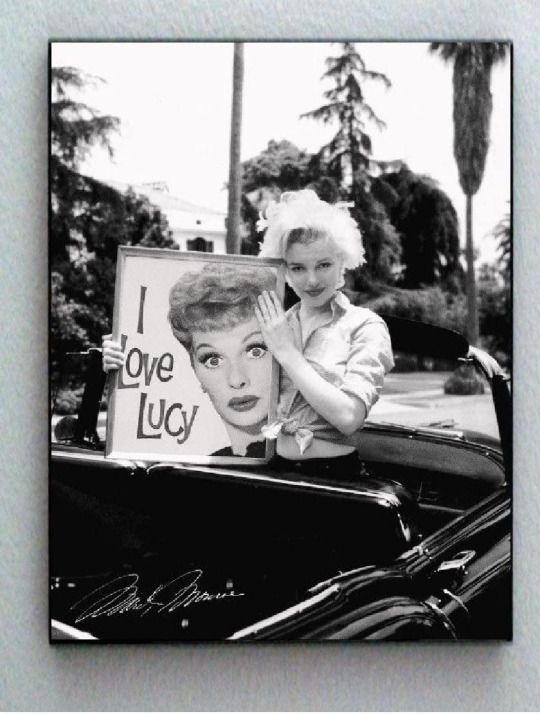
Marilyn Monroe (born Norma Jeane Mortenson) was an actress, model, and singer. Famous for playing comedic "blonde bombshell" characters, she became one of the most popular sex symbols of the 1950s and early 1960s and was emblematic of the era's changing attitudes towards sexuality. She was a top-billed actress for only a decade, but her films grossed $200 million by the time of her death in 1962. More than half a century later, she continues to be a major popular culture icon.
"When I was five I think, that's when I started wanting to be an actress. I didn't like the world around me because it was kind of grim, but I loved to play house. When I heard that this was acting, I said that's what I want to be. Some of my foster families used to send me to the movies to get me out of the house and there I'd sit all day and way into the night. Up in front, there with the screen so big, a little kid all alone, and I loved it.” ~ Marilyn Monroe,1962

Lucille Ball never worked with Marilyn Monroe, but meet her in 1953 at Ciro’s Nightclub on Sunset Strip, along with Betty Grable, and Red Skelton. Monroe’s immense popularity permeated Ball’s work none-the-less.
At the start of “Changing the Boys’ Wardrobe” (ILL S3;E10) the gang is heading to the movies to see “That picture we’ve been trying to get to for weeks with Marilyn Monroe.” The movie is likely Gentlemen Prefer Blondes, which premiered in New York City in July 1953. On November 5, 1953, the same day the episode was filmed, Monroe’s new film How to Marry a Millionaire was released in the US.
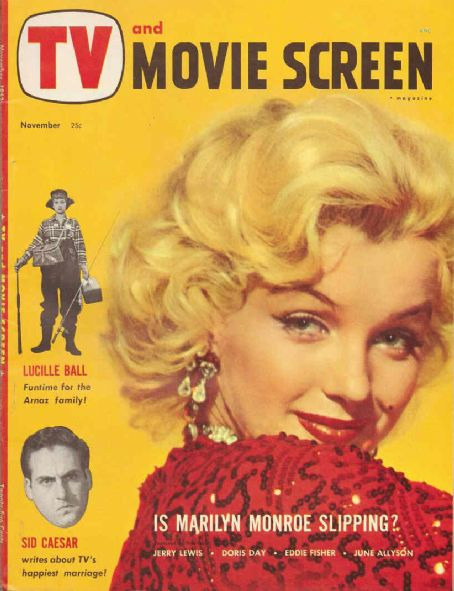
The November 1953 cover of TV and Movie Screen Magazine saw Lucy (in “The Camping Trip”) and Marilyn wearing the dress she wore on the May 1953 cover of Life Magazine promoting Gentlemen Prefer Blondes.
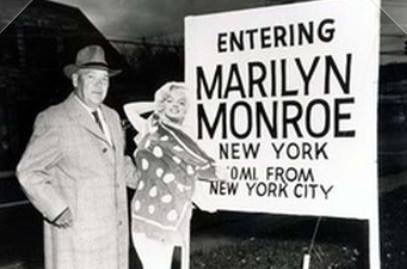
Also on November 5, 1953, the town of Monroe, New York (60 miles from New York City) was temporarily renamed Marilyn Monroe.

The film later inspired much of the plot of “Second Honeymoon” (S5;E14), Lucy’s failed attempt to make their transatlantic crossing to Europe more than just a working vacation.
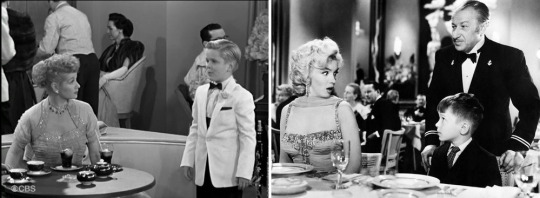
Monroe’s dinner companion turns out to be a seven year-old boy, just like Lucy’s ping pong partner turns out to be young Kenneth Hamilton (Harvey Grant).
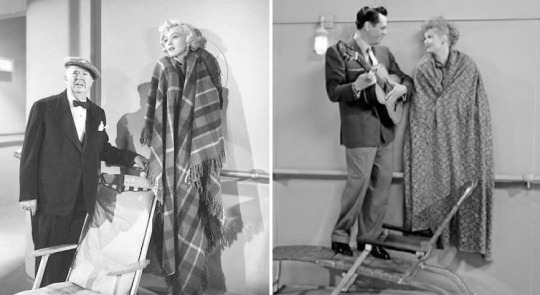
Lucy gets stuck in a porthole just as Monroe did, also draping a blanket around her shoulders so passersby wouldn’t know what was really going on.

The idea for the burlap potato sack dresses in “Lucy Wants A Paris Gown” (ILL S5;E20) comes from Monroe’s real life.
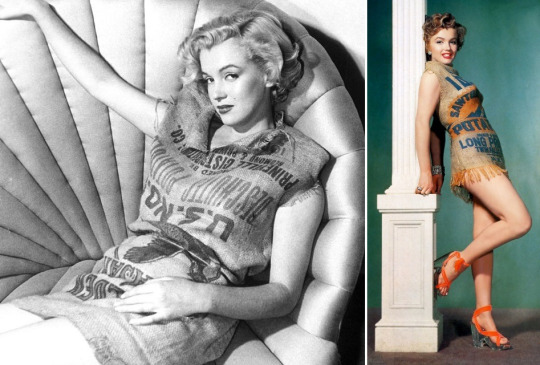
In 1951 Marilyn Monroe took a series of high fashion photographs wearing a potato sack as a response to a journalist who said that she might look sexier in a burlap sack than her usual fashion choices.
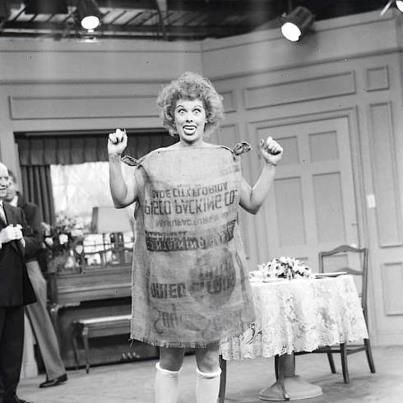
Lucy first wore burlap at the end of “Mr. and Mrs. TV Show” (ILL S4;E24) as her scary version of a Phipps make-over.

In “Ricky’s Movie Offer” (ILL S4;E5) Lucy and Ethel argue about who looks more like Marilyn Monroe.
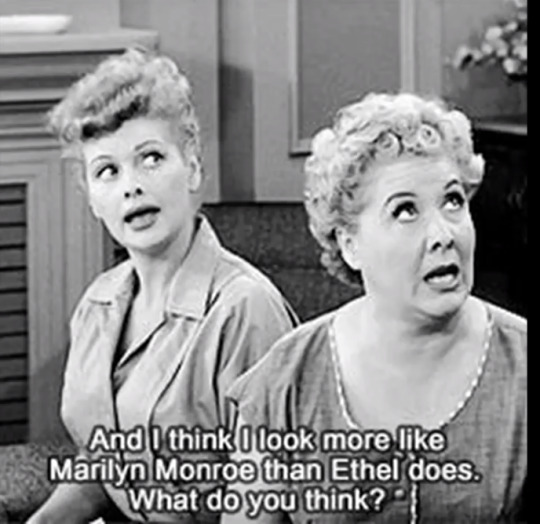
While Lucy has the facial features, Ethel has the blonde hair.

Fred (hilariously) settles the argument!
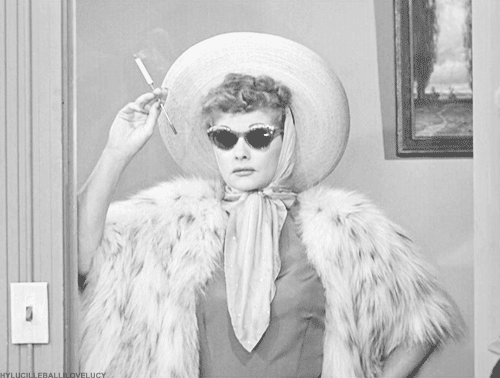
In “Ricky’s Screen Test” (ILL S4;E7) a long list of Hollywood names are dropped in anticipation of hobnobbing with celebrities, including Marilyn Monroe.
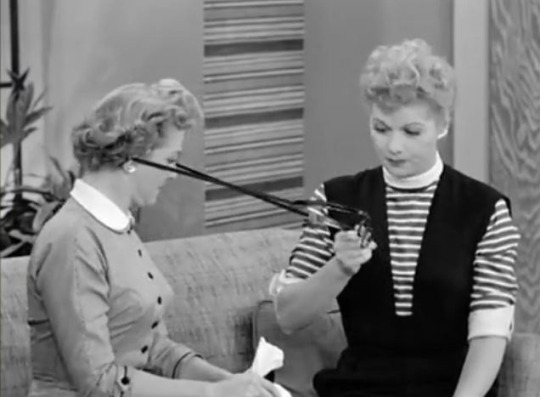
In “Lucy and Harpo Marx” (ILL S4;E28) Lucy wonders if Ethel might pass for Monroe to a near-sighted Carolyn Appleby. After Ethel tries to walk like Marilyn Monroe, Lucy decides that “nobody is that near-sighted!” Fred says that he looks more like Marilyn than either of them!
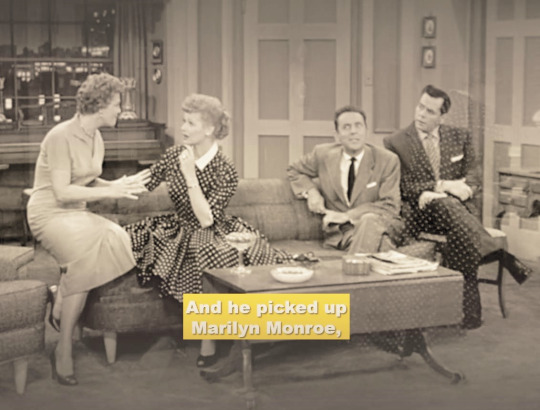
In “Lucy and Superman” (ILL S6;E13), the Appleby’s come over for a social evening that Ethel calls “the bore war” because the couples only talk about their children. As the scene opens, Caroline is in mid-sentence talking about a Marilyn Monroe film.
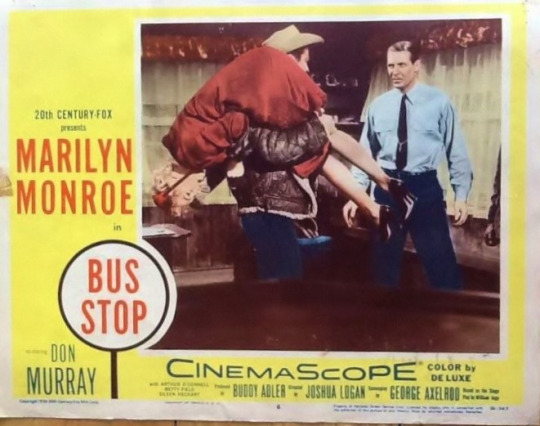
CAROLINE: “...and he picked up Marilyn Monroe, slung her over his shoulder and carried her off!”
Although the title is never mentioned, the film they are discussing is Bus Stop, starring Marilyn Monroe and Don Murray. It was released in August 1956, two and a half months before this episode was filmed.
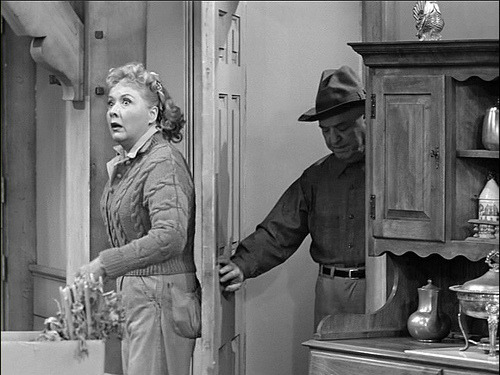
When “Lucy Does the Tango” (ILL S6;E20), she stuffs eggs down her blouse and Ethel stashes a some in her back pockets. Lucy tells her, “Whatever you do don’t try to walk like Marilyn Monroe,” but the ‘yolk’ is on Ethel when Fred suddenly enters through the kitchen door!
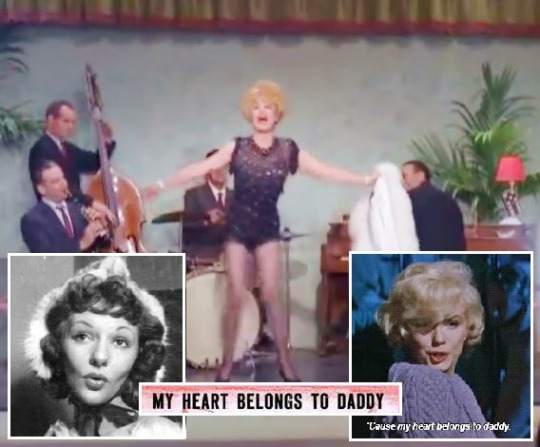
In “Lucy the Gun Moll” (TLS S4;E25), Lucy plays Lucy Carmichael and Rusty Martin. The name Rusty Martin was probably derived from Lucy’s hair color and the surname of Mary Martin, who introduced the song “My Heart Belongs to Daddy” (music and lyrics by Cole Porter) in the 1938 Broadway musical Leave It to Me. Marilyn Monroe sang it in the 1960 film Let’s Make Love. In that same film, Harry Cheshire, who played Sam Johnson in “Oil Wells” (ILL S3;E18), played Monroe’s father. Jerry Hausner (Jerry, Ricky’s Agent) and Joan Banks (Reporter Eleanor Harris in “Fan Magazine Interview”) played uncredited supporting roles.
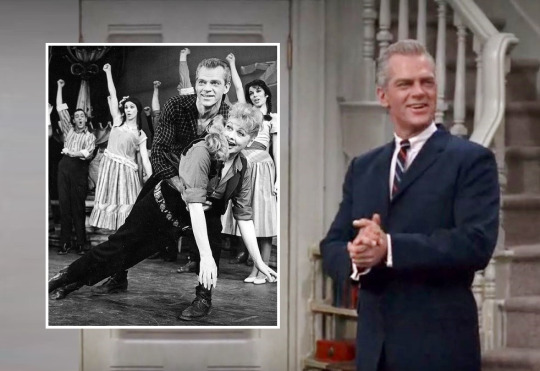
Lucy and Marilyn shared a leading man in handsome Keith Andes. Andes was Lucy’s male lead in Wildcat on Broadway, and later played was featured on three episodes of “The Lucy Show.”
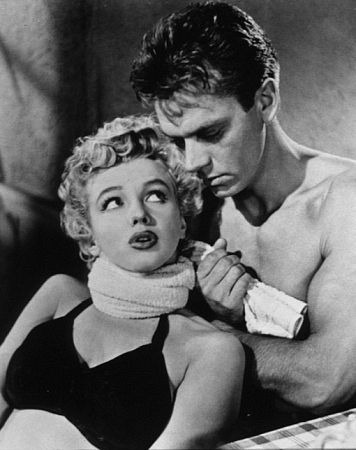
In 1952, he played opposite Marilyn in Clash By Night, an RKO picture.

In “Lucy Gets Ricky on the Radio” (1952), the June 3, 1952 of Look Magazine actually had Lucille Ball and Marilyn Monroe on the cover! Monroe was promoting Clash by Night, and Desi had written a feature on his wife for the magazine. So Marilyn actually did appear on “I Love Lucy” - if only in a still photo.
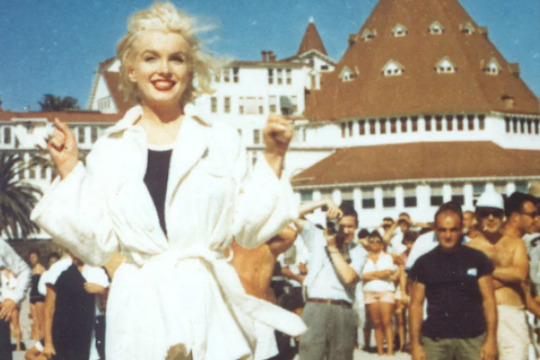

Some Like It Hot (1959) is arguably one of Marilyn Monroe’s most popular films. What does it have in common with Lucille Ball? In 1958, both Lucy and Monroe were depicted at San Diego’s famous Del Coronado Hotel. It is the hotel that the Ricardo’s and Mertzes stay at in “Lucy Goes to Mexico” (LDCH S2;E1) as well as the backdrop for much of the film. Although Desilu filmed establishing footage of the hotel, the cast stayed in Hollywood, while Monroe went on location (as seen above). In “Lucy Goes to a Hollywood Premiere” (TLS S4;E20), Mr. Mooney says he wouldn’t buy a second hand nightie if it had been worn by Jack Lemmon in Some Like It Hot.
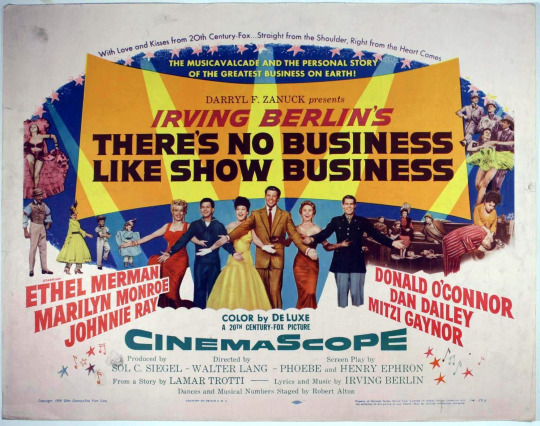
The Irving Berlin song “There’s No Business Like Show Business” was sung on “I Love Lucy” and “The Lucy Show.” Although it was originally from the Broadway musical Annie Get Your Gun (1946), it also served as the title and was performed (by Merman) in the Marilyn Monroe film There’s No Business Like Show Business in 1955.

In 1952, Marilyn co-starred by Richard Widmark (”The Tour” ILL S4;E30) in the film noir drama Don’t Bother To Knock. The film also featured “Lucy” players Lurene Tuttle (Fine Arts League President), Verna Felton (Mrs. Porter), Gloria Blondell (Grace Foster), as well as Harry Bartell, Olan Soule, Robert Foulke, and Bess Flowers.
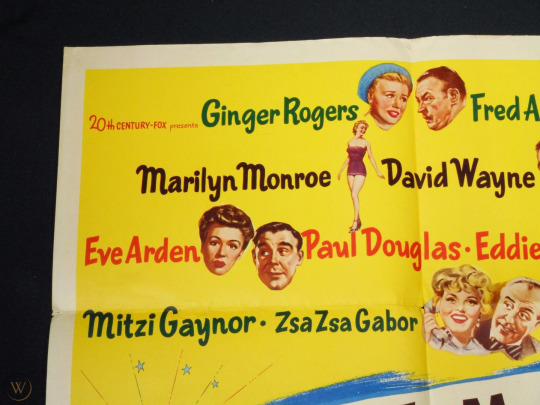
That same year, Monroe starred in We’re Not Married! opposite Lucy’s friend and former co-star Ginger Rogers, as well as Eve Arden (”Hollywood at Last!”), Paul Douglas (”Lucy Wants a Career”) and Eddie Bracken (Too Many Girls).
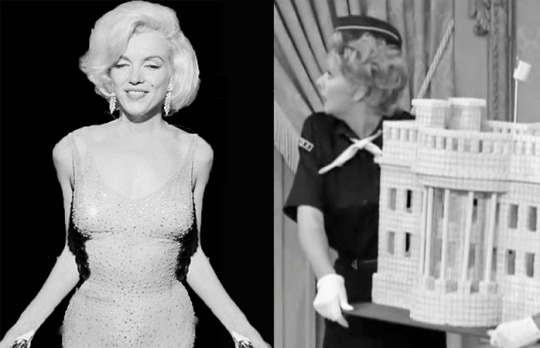
One of Monroe’s most iconic moments came in March 1962 when she sang “Happy Birthday” as a birthday present to President John F. Kennedy in a public birthday celebration also attended by Lucy’s friends and co-stars Jack Benny, Jimmy Durante, Henry Fonda, Danny Kaye, Shirley MacLaine and Elliott Reid. A year later, Lucy Carmichael also gave Kennedy a present, a sugar cube replica of the White House on “The Lucy Show” with Elliott Reid doing Kennedy’s offstage voice as well as playing a small on-camera role!
"I never quite understood it, this sex symbol. I always thought symbols were those things you clash together! That's the trouble, a sex symbol becomes a thing. I just hate to be a thing. But if I'm going to be a symbol of something I'd rather have it sex than some other things they've got symbols of." ~ Marilyn Monroe, 1962
Monroe was married (and divorced) three times:
James Dougherty, Merchant Marine & Policeman (1942-46)
Joe DiMaggio, Baseball Player (1954-55)
Arthur Miller, Playwright (1956-61)

In “Lucy is Enceinte” (ILL S2;E10), Fred gives Lucy a signed baseball for his future 'godson’. When he asks Lucy to read out the signature, she at first says “Spalding,” the ball’s brand name, but then finds it is signed by Joe DiMaggio.

In “Ragtime Band” (ILL S6;E21), Little Ricky asks his Uncle Fred:
LITTLE RICKY: “Who’s Joe 'Maggio?” FRED: “'Who’s Joe 'Maggio?’ You talk more like your father everyday.”
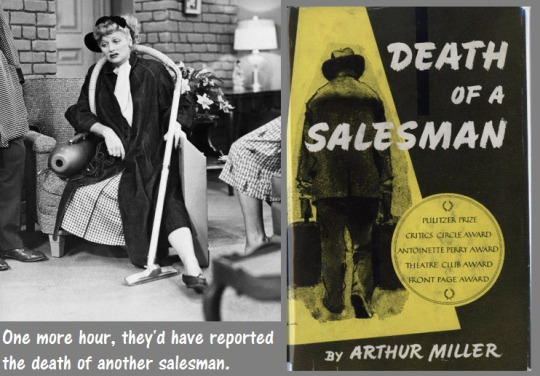
In “Sales Resistance” (ILL S2;E17), Lucy compares herself to Willy Loman, the title character in Death of a Salesman, a Pulitzer Prize-winning play by Arthur Miller first produced on Broadway in 1949 and made into an Oscar-nominated film in 1951.
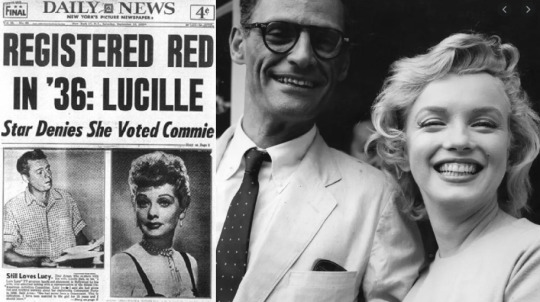
Speaking of husbands, Desi Arnaz has something in common with Marilyn Monroe, too. Both of their souses were accused of being Communists by the House Un-American Activities Committee during the 1950s. Both Lucille and Arthur Miller were cleared of charges and their careers continued, although that was not true for many celebrities of the time.
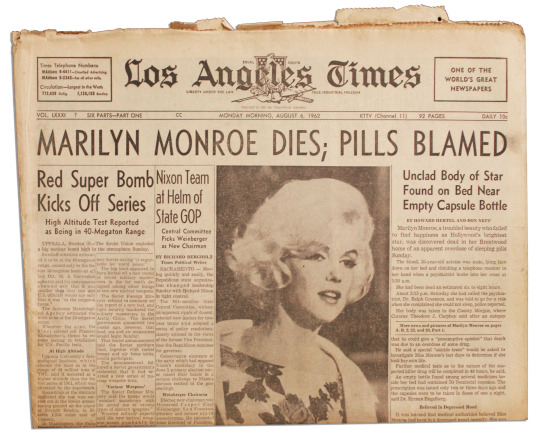
Monroe died on August 4, 1962. The toxicology report showed that the cause of death was acute barbiturate poisoning. Empty medicine bottles were found next to her bed. The possibility that Monroe had accidentally overdosed was ruled out because the dosages found in her body were several times over the lethal limit.
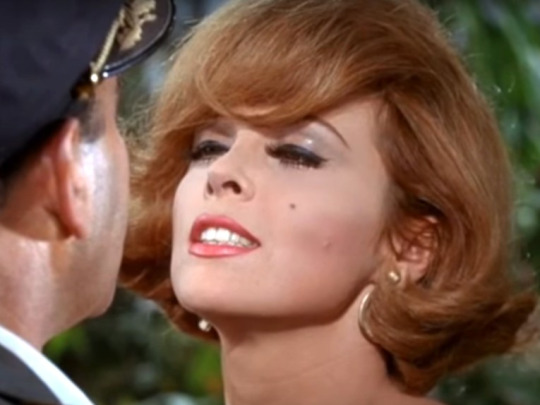
The character of Ginger, the movie star castaway on “Gilligan’s Island” (1964-67) was described during casting as a combination of Lucille Ball and Marilyn Monroe. Tina Louise had Lucy’s red (ginger) hair and Monroe’s shapely physique. The series also featured Natalie Schafer (Phoebe Emerson) as Mrs. Howell, and Alan Hale Jr. as the Skipper. Hale performed on “The Lucy Show” and “Here’s Lucy”. Series creator Sherwood Schwartz was a Lucy fan. His brother Elroy Schwartz actually wrote scripts for Lucille Ball.

In the 2013 web-series “Ryan & Ruby” both Lucille Ball and Marilyn Monroe are given special thanks for their inspiration. The last name of star and creator Ryan Burton's character is "Carmichael", the same as Ball's character on the "The Lucy Show". In Ryan’s kitchen there are fridge magnets with photos of both Lucy and Marilyn.
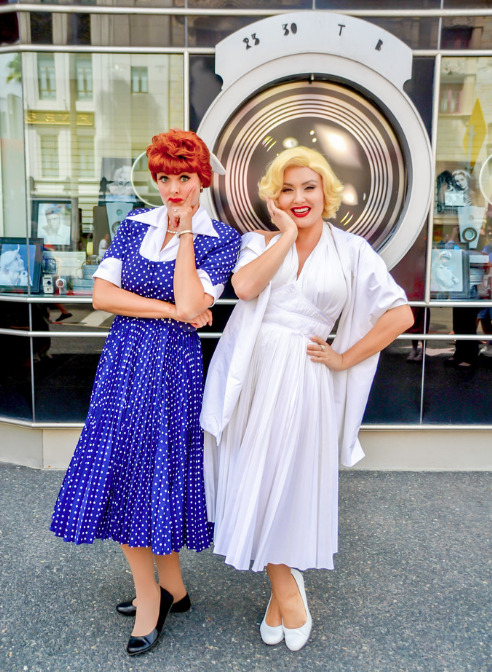
Lucy and Marilyn are street characters at Universal Studios theme parks, their iconic hair and costumes making them instantly recognizable.
The same day Marilyn Monroe was born in 1926, another Hollywood icon with connections to Lucille Ball was also born, Andy Griffith. To read his birthday blog, click here!
#Marilyn Monroe#Lucille Ball#I Love Lucy#William Frawley#Desi Arnaz#vivian vanc#the lucy show#Ryan and Ruby#Gilligan's Island#Tina Louise#Arthur Miller#Joe DiMaggio#Keith Thibodeaux#Alan Hale Jr.#natalie schafer#John F. Kennedy#Paul Douglas#Eve Arden#Ginger Rogers#Verna Felton#Ethel Merman#Richard Widmark#There's No Business Like Show Business#Hotel Del Coronado#Don't Bother To Knock#Some Like It Hot#Look Magazine#Keith Andes#Clash By Night#The Seven Year Itch
49 notes
·
View notes
Link
Dee Rees was waiting outside a discreet home on a quiet street in Los Angeles on a warm day in June, wearing a T-shirt emblazoned with the words “Arrest the President.” She led the way past her fragrant jasmine bushes, past a kidney-shaped pool, past a Great Dane the size of a tween into an intimate guesthouse that had been converted into a music studio. The walls were painted dark blue and nearly every spare inch of wall and floor held equipment: Fender guitars, synths, amps, speakers and keyboards. The floor was covered by so many power cords that they resembled an area rug. A recording of an off-key voice earnestly singing was playing loudly on a loop. Rees shot me a pained look. “I’m not a singer,” she said.
Nearby, standing at a microphone, the singer Santigold was humming along to Ree’s voice and mimicking the undulations until she knew them by heart. The musician Ray Brady, sitting at a computer nearby, cycled through a series of drum-machine sounds until they heard one they all liked, and Santigold started singing over it. The air-conditioner was off — it interfered with the quality of the recordings — and the air was dense with humidity that no one seemed bothered by.
Rees and Santigold were recording a series of demos for a big-screen futuristic opera titled “The Kyd’s Exquisite Follies.” The screenplay, which Rees had been working on for about a year, describes the journey of a young, black androgynous musician living in a small town who sets off for “It City” in search of stardom. “An outsized, sequin-spangled, sunglassed Cosmic Being leans into frame,” reads the description for the first scene. “It is Bootsy Collins if Bootsy was simultaneously tripping on acid, André 3000 and CBD Frosted Flakes with extra sugar.” Her mood board for the project features images from the cultural festival Afropunk and a dream cast of Erykah Badu, Beyoncé, Janelle Monáe and the R&B singer Syd. The whole thing almost sounded like a fantasy incubated deep in a Twitter thread, but Rees later told me that she was inspired to combine the cultural legacy of “The Wiz” with the grandeur of the “Star Wars” franchise to create a kid-friendly movie as canonical as her reference points. “I was like, ‘Where’s “The Wiz” for us, for our kids, for queer kids?’ ” she said.
Rees has been working toward this moment for nearly 10 years, assuredly moving from indie films into blockbuster cinema with the hope of establishing a creative freedom few directors attain. She is placing a thick spread of bets, in the hope that she will soon be able to play as boldly as she wants. Legacy, she told me, is her ultimate goal: “I want to create work that matters and lasts.”
At 43, Rees has already had the type of success that will outlast her. In 2011, she released her first feature film, “Pariah,” a lush coming-of-age drama about a young black woman named Alike grappling with both her sexuality and the world’s response to it. The movie won more than a dozen awards, including, most notably, the N.A.A.C.P. Image Award for Outstanding Motion Picture. Last year, the movie was included on IndieWire’s list of best films of the past decade, along with “Moonlight,” “Carol,” and “Call Me by Your Name” — movies that also feature queer narratives, though it’s worth noting that “Pariah” came out years before them. In 2017, she released her next feature film, “Mudbound,” a drama about the lives of a black family and a white family working the same plot of land in Mississippi in the 1940s. It garnered four Oscar nominations, including Best Adapted Screenplay, making her the first black woman to be nominated in the category. Her latest project, opening on Feb. 14 before streaming on Netflix, is her most Hollywood yet: Starring Anne Hathaway, Willem Dafoe and Ben Affleck, “The Last Thing He Wanted” is an adaptation of the 1996 Joan Didion novel about an American journalist investigating illicit arms sales to Central America during the Reagan administration. It is Rees’s attempt to demonstrate her range across scale, genre and star power.
But here in Los Angeles, her deepest professional desire was underway. Rees had already secured a producer for “Follies” in her longtime collaborator, Cassian Elwes, as well as a costume designer. Lucasfilm’s Industrial Light and Magic had signed on to create the visual effects. The next stage of the process was to produce a music sample that could be played for potential financiers, studio partners and distributors, to generate excitement for the project.
The main song she and Santigold were working on that afternoon was a duet between the hero, the Kyd, and an unseen entity offering support from afar. “The intention here is that the Universe is accompanying her, and she doesn’t realize it,” Rees informed the room, using her hands to show two entities orbiting around each other, the smaller one oblivious to the larger one. She described the song as a ballet, with choreography. The Universe is not a metaphor, she explained; it’s an actual character, a guiding light and love interest, which she imagined being played by Erykah Badu. The song lyrics included melancholic lines like “It was easier when no one was looking” and “People see you as they need you to be.”
Santi, as everyone in the room called her, finished singing one part and began recording another, in a lower intonation to indicate a different voice. She and Rees were building out the bones of a pivotal point in the narrative: The Kyd is reflecting on the isolation, loneliness and self-doubt that accompany a rise to stardom — feelings that Rees teased out from her own life experiences as a young director. They worked intently for nearly an hour this way, playing keyboard, looping drums, recording Santigold as she sang both parts, then pausing to get feedback. When Rees wasn’t feeling something, it was obvious: She remained silent but shook her head “no.” When she liked something, she bounced in her seat and offered affirmations like “that’s hot.”
Watching the two women work, I realized that Rees didn’t just have an idea for music, she had created an entire universe, writing all the songs, arranging the melodies and constructing a 3-D model in her head of the sets and landscape. To her, composing compelling songs and comedy numbers while grabbing milk at the bodega comes as effortlessly as directing some of the biggest actors working in Hollywood. Despite that, the biggest question about her career now is whether Hollywood will allow her the longevity she craves.
“I know this character,” Rees said at one point about the Kyd, though she might have been talking about her own journey as an artist so far. “That feeling of being trapped, wanting to be an artist, knowing the odds are against you and doing it anyway.”
A few weeks later, Rees was sitting in a small coffee shop in Harlem, not far from where she lives with her wife, the author Sarah M. Broom, who recently won a National Book Award for her memoir, “The Yellow House.” Rees had been stationed there for a while, talking to other regulars, reading the short-story collection “Heads of the Colored People,” by Nafissa Thompson-Spires, and working on her laptop. Rees is a minimalist: Everything about her has an understated elegance, from the twists in her hair to the black and camo Jordans that she likes to wear. That day, she was dressed in a tailored white-and-pink-dotted button-down shirt and carrying a backpack.
Rees told me that people often describe her success in the film industry as overnight, which feels dismissive of the years she spent hustling for “Pariah” and glosses over the years that she struggled to sell pilots and feature films since then. “I’ve spent 12 years slugging away,” she said. She’s quick to point out that most of her work has not made it to market.
Rees said her strategy is to work on “five things at once and see which one sticks.” Each time we talked, she was working on a new project. Once it was a television show about a black police officer in the South, set in the 1970s. Another time it was a potential collaboration with a black playwright. This is both a survival tactic designed to navigate the ever-changing tides of a mercurial entertainment industry and perhaps also a defense mechanism: better not to get too attached to a project that doesn’t get picked up. The gap years after “Pariah” taught her to be strategic.
“For me, everything still comes with a grain of salt,” she said. “I never trust if it’s going to happen until you see a grip truck pulling up.” Many black women who make a compelling, noteworthy debut never manage to make a second feature — think of Julie Dash or Leslie Harris, whose names you might not know but who are responsible for, respectively, the indie films “Daughters of the Dust” and “Just Another Girl on the I.R.T.” “It seemed like people wondered if that was a fluke,” she said about “Pariah.” After “Mudbound,” she felt that question of her directorial ability has been answered. “Now it’s just about, How much do I get to do?”
From Rees’s vantage, this is the time to be working as quickly and furiously as she possibly can to get all of her dream projects off the ground — not just “Follies” but also a lesbian horror film she plans to write with her wife and a sci-fi graphic novel that she can eventually adapt for the screen. “It’s a creator’s market,” she told me. “There are more canvases, and not just feature films. You can work online, you can make different kinds of TV. You can make your thing, and they’ll come to you.”
Rees was referring, in part, to streaming services, specifically Netflix, which financed and is distributing “The Last Thing He Wanted.” Over the past five years, Netflix has done the same for hundreds of original shows and movies, many of which are critically acclaimed and attract as much attention and accolades than the offerings from traditional movie studios. In 2019, Netflix released 60 films, and analysts estimate the company spends more than $8 billion on original content a year. “We’re not a 100-year-old studio or own intellectual property like Disney does,” Scott Stuber, the head of films at Netflix, told me. “We don’t have an archive or a library, so it’s very important strategically to get in business with filmmakers like Dee, Alfonso Cuarón, Martin Scorsese, and that is our differentiator.” Netflix’s elbowing into Hollywood has propelled other companies to follow suit, including Disney, Hulu, Apple and Amazon, all of which now produce exclusive streaming content. Netflix’s dominance is likely to be challenged in the coming years, but the company has already reshaped consumer standards, including the expectation that people can watch high-quality, Oscar-worthy first-run entertainment from the comfort of their couch.
To stay competitive, traditional studios now have to pay attention to what those services are doing and try to beat them at their own game. Many of the directors making the best material are coming from the indie world, Rees reminded me: Ryan Coogler, Ava DuVernay, Barry Jenkins. “And it’s not because of altruistic reasons but because of moneymaking reasons,” she said. “Studios are realizing it’s profitable to keep their eyes open. Netflix forced the rest of the industry to take more risks. The advantage for filmmakers is that they’re making it impossible for the rest of the industry to be dismissive or willfully ignorant, and they make the industry consider films and filmmakers that they might not have considered.”
Rees also pointed out the desire for content aimed specifically at black consumers, noting that studio heads and industry leaders were finally paying attention to the black appetite: “We’re the consumers and we’re the producers. And we’re saying: No more ‘Green Book.’ We’re not interested in that.” Though Rees tends to avoid social media and the internet, she sees them as levers for this radical change. “The gatekeepers can still modulate production, but they can’t modulate awareness in the same way,” she told me. “With that awareness comes a hunger, and it sustains a stable of artists.”
In the 1970s, Rees’s parents bought a home in a largely white neighborhood in Nashville. Her father was a police officer; her mother, a scientist at Vanderbilt University. When I first asked Rees to describe her childhood, she told me it was a “typical, boring suburban experience.” She was an only child who liked to lose herself in video games, “Garfield” comics and Choose Your Own Adventure books. The family was solidly middle class. “At the grocery store, it was my job to hold the calculator and calculate the grocery bill as we went along,” Rees recalled fondly.
But Rees’s “typical” childhood also included anecdotes about growing up adjacent to white people who questioned her family’s presence in their midst. Neighbors hung Confederate flags as curtains. Kids toilet papered their trees, prank rang the doorbell, ripped up the roses that her mother planted in a wagon wheel. People regularly tossed garbage in their yard as they drove or walked by. “It was my job to pick up that trash,” Rees said. “They always seemed to be looking at us like, ‘How can you be here, how can you have more than us?’ ” Rees’s father often parked his police car outside their home to “let people know not to [expletive] with us,” Rees said. “You were constantly bracing for it, preparing for it and trying not to let it provoke you, as it was meant to do.” These incidents, and the questions about belonging they raised, can be felt in all her films.
Rees graduated in 2000 from Florida A&M University with a master’s degree in business administration and worked in marketing for a series of health and beauty companies. Rees envisioned herself as Marcus Graham, one of the young black advertising professionals in the movie “Boomerang.” “I really thought I’d be working with people like Strangé,” she said, referring to the eccentric Grace Jones character who gives birth to a perfume bottle in a cosmetics commercial. None of the jobs lasted more than a year, but the detour was productive: She went on a commercial shoot for a client, Dr. Scholl’s, and followed the production assistant around out of curiosity. She was energized watching the work, prompting her to reconsider her career trajectory. She was accepted to New York University’s graduate film program in 2003.
Rees had never been to art school or even touched a camera. “I had no idea what I was doing,” she said. She struggled with the assignments, which often consisted of making short film experiments. “I failed and I failed hard,” she recalled. Her professors seemed to pay more attention to the better students. “It felt like an instant divestment of interest.” By the second semester, she was considering dropping out. “On the first day, they told us that ‘only two of you will make it,’ ” she said. “And I was not the one who seemed like they were going to make it. I was like, ‘This is a waste, it’s so expensive, I shouldn’t do this.’ ” At 27, she worried that she was too old to start a new career.
Rees confessed all her fears and insecurities to her girlfriend at the time, who told her: “O.K., so there’s only going to be two of you. That means you and who else?” The pep talk helped, as did the support from a few professors, including Spike Lee, who has served as the film program’s artistic director for nearly two decades. Lee was impressed by Rees’s storytelling abilities and her eye, which already felt uniquely her own — rare for anyone, but especially students. “In my experience, very few people have a style right off the jump,” he told me recently. “It’s something that you develop over time, and she had it. I never had any doubts about her being successful. I could see that she was going to do what she had to do to get where she wanted to get.”
She felt her work began to click when the assignments moved into documentary. “That is when I found myself and found my voice,” she told me. She took a trip to Liberia with her grandmother and the budding cinematographer Bradford Young. “It just felt like no one was looking, and I felt confident and was able to make the doc.” That film, “Eventual Salvation,” tells the story of her 80-year-old grandmother, Earnestine Smith, as she travels to Monrovia, where she lived for decades, and confronts the aftermath of a devastating civil war.
She loved imagining herself into the shoes of her subjects. “It helped me be a better director, because I could see that ‘Oh, if I’d gotten this shot, it would be a better dynamic, better storytelling through body language.’ ” Rees’s graduate thesis was a short film called “Pariah,” and the strength of the script landed her at Sundance Labs to incubate the short into a feature. Lee offered guidance, and Young, still unknown, drenched the film in the shimmering, richly colored patinas that he would later use in movies like “Arrival” and “Selma.”
While at N.Y.U., Rees shortened her name from Diandréa to Dee. She was establishing a boundary between herself and the world that to this day feels as if it safeguards her personal life. She was coming out as a lesbian, which at first, her parents chalked up to an “art-school thing,” Rees said. But once they realized she was truly in love with a woman, they imploded. Her mother came to New York to try to stage an intervention. Her father was embarrassed. “Nashville is superconservative and small, and I guess word was getting around,” Rees said. Neither parent spoke to her for some time, but both came to see a screening of “Pariah” in New York in 2011. The support in the room eased their worries, as did the affiliation with Sundance. “My life wasn’t a wreck, which somehow made it more acceptable for them,” Rees said.
A common theme threading through Rees’s projects is the way the world places limits on people and whether that destroys or liberates them. The moments in her movies at which her characters confront that existential dilemma are often extremely subtle, but powerful nonetheless. In “Bessie,” the 2015 HBO movie Rees made about the blues singer Bessie Smith, we see how Smith rebels against societal expectations in her sexual fluidity, hard drinking and even in her confrontation with the Ku Klux Klan at one of her shows. But the moment that is most revealing is Smith, played by Queen Latifah, sitting fully nude at a vanity, her body shining with oil, seeing herself surrounded by the trappings of fame but ultimately alone and aging. She’s facing the choices she has made and seemingly deciding whether she’ll make different ones tomorrow. In “Pariah,” it’s the spark of possibilities reflected in young Alike’s eyes as she watches a dancer slide down a pole to Khia’s pleasure anthem “My Neck, My Back” in a gay nightclub.
What is striking about Rees’s work is that even though none of her movies are explicitly autobiographical, she still finds ways to channel her life experiences into them. Embedded in “Mudbound,” for example, is the experience of her great-grandparents, who picked cotton, but it also reflects the amorality of racial violence and how a country can fight against it in a war, while still perpetuating it at home. At the center of “The Last Thing He Wanted” is a father-daughter relationship complicated by guilt and obligation, but it’s also a thriller whose main character is determined to expose government corruption.
Rees realized early in her career that as a female director working in Hollywood, she wouldn’t have the same liberty as, say, Richard Linklater or Noah Baumbach to explore the details of her life onscreen. Rees made compromises so that she could still work on the themes that interested her most. “When I first started out, I was like, ‘I’m not going to do adaptations,’ ” she told me. “I only want to do my own stuff, but I quickly realized that I couldn’t survive because of the time it takes to get people to want to do your original thing.”
In 2014, Cassian Elwes, a longtime Hollywood veteran who has produced such films as “Lee Daniels’ The Butler” and “Dallas Buyers Club,” found himself horrified after reading about the extreme gender imbalance prevalent in Hollywood movie making. Dr. Stacy L. Smith, a communications professor at the University of Southern California at Annenberg, has found that less than 5 percent of major Hollywood movies were directed by women. People of color were also dramatically underrepresented. (Those numbers have not fluctuated significantly in the years since.) Elwes was similarly shocked to read that most young white male directors make their sophomore projects not long after their first; most women of color take years. Many of them, unable to support themselves during that gap, give up.
Around this time, two young producers brought Elwes the script for “Mudbound.” He fell in love with it, and his mind drifted to “Pariah,” which he’d seen at Sundance. Elwes sent Rees the script. A few years earlier, Rees had wanted to adapt the novel “Home,” by Toni Morrison, to explore the paradox of freedom for black Americans returning home from overseas; now she realized she could inject that desire into “Mudbound.”
“He was the first producer who was just like, ‘It’s yours,’ ” Rees recalled. “It wasn’t exploitative or like you should be grateful. He was like, ‘Whatever you want to do, let’s work it out.’ He’s believed more in me than some producers of color.”
A movie like “Mudbound” could easily be saturated with simplistic Hollywood narratives about the resilience of black people and the restorative power of interracial friendships. But Rees was not afraid to show a world where some white people are evil and none will save the black characters. Rees first impression of the script was that it was “a little too sweet.” It featured music as the balm easing tension between the two families. Rees wrote more scenes explicitly featuring the Jackson family, including one around a dinner table where they discuss their dreams of purchasing their own parcel of land, only to be interrupted by the white landowner, who demands they come unload his truck. The film finds its own emphatic language for the spectral horror of white violence in America through quiet vignettes: The tight face of a well-dressed black man, riding in the back of a white man’s dusty pickup truck. The wet and swollen face of a white woman sobbing into the arms of a black matriarch, whose resignation and fatigue can be read in the set of her mouth.
Rachel Morrison, the film’s cinematographer, who received an Oscar nomination for the film, said she was drawn to Rees’s ability to “put the audience squarely in the main character,” she told me. For example, when filming Laura, a woman at a loss for who she is in the world, the shots feature her petite, wiry body dwarfed by the soggy terrain and gaping blue sky. Rees was “uncompromising in only the best ways,” Morrison said, in a tone rich with admiration. She recalled an instance where Rees wanted a shot looking through a screen door, from the outside world into a dark home. “It was a ton of work, balancing the bright sun and dark shadows, but I was like, ‘If it’s worth it to you, I’ll do it.’ ” It was worth it to Rees. Morrison spent close to an hour manipulating the set to capture what would amount to seconds of screen time. When Morrison saw the final cut, she realized the elegance of the shot and how beautifully it articulated the difference between the two families and the worlds they inhabit. “It’s one of my favorite shots in the film,” she said.
After they finished “Mudbound,” Rees told Elwes that she wanted to adapt the Joan Didion novel. He knew Didion’s agent and was able to option “The Last Thing He Wanted.” “We took it around to all the studios, and no one would deal with it,” she said. “Netflix jumped in and saved it. But it was hard in that way. You think because it’s Joan Didion, like, of course — but nope.”
Rees struggles not to take the studios’ lack of interest in her work personally. When I asked her how she rationalized their indifference, she took her time answering, clearly weighing how much of her inner thoughts about Hollywood she wanted to air in public, staring into her coffee all the while. “When stuff doesn’t make logical sense, to me, I go to a place where there’s only one thing that can explain this. You know what I mean?” She paused again, fiddling with her latte. “It feels like a double standard, and the double standard to me is race.”
I asked her how she coped with being so demonstrably talented as a filmmaker and yet feeling thwarted in her efforts at the same time. “The only refuge I have is to do more work, to be relentless and keep making and making, and hopefully, eventually I won’t have to continue to prove that I have the capabilities.” She felt this deeply when “Mudbound” was passed over by major studios, even though it resembled a Birney Imes photograph come to life and featured mesmerizing performances by Carey Mulligan and Rob Morgan. It eventually sold to Netflix, reportedly for $12.5 million, the largest deal to come out of Sundance in 2017. “I’ve learned to go where the love is and work with who wants to work with you,” she told me. “The thing you’re up against is not new. Since first grade, the moment you enter school, you’re up against racism. But it’s still stunning sometimes.”
What remains striking about Rees is that these challenges haven’t muted her ambition. Elwes repeatedly highlighted it. “It’s gigantic,” he said, marveling. “She could be knocking out independent movies all day long if she wanted to.” But instead, with something like “Follies,” she is trying to create a pop-cultural empire. “She’s building a world, and right now in Hollywood, most people are just making another version of a comic book or a sequel or a remake,” Elwes said. Her fearlessness and talent are why he immediately agreed to help her produce and finance her sci-fi opera after she floated the idea by him in a text message. He has been hustling to raise the $80 million or so that she needs to pull it off. “It’s not a slam dunk,” he said, “but whoever takes the risk will get the reward.”
Toward the end of our meeting at the coffee shop, Rees told me shyly — a rare mode for her — that her biggest dream is to work on a major feature-film trilogy, something even more audacious than “Follies.” “I want to have a world with a black woman at the center of it, who ends up leading a rebellion,” she said. “I want to create a whole new world rather than color in somebody else’s.” The trilogy Rees wants to build takes place in a dystopic time, a hellscape devastated by climate change and out-of-control social media where people have to meet a minimum “credit” rating in order to have a decent quality of life.
Rees hopes that “The Last Thing” will be a bridge between her past work and her larger ambitions. Unlike her previous films, “The Last Thing” is a fast-paced political thriller with car chases, shootouts and body counts that includes tight close-ups and impressionistic landscape shots. The effect is claustrophobic and dizzying — a departure from Rees’s previous, more linear work — and yet the audience remains, as Morrison reflected, squarely in the perspective of Elena McMahon, the journalist at the center of it, played by Anne Hathaway. As McMahon loses her moral compass, the viewer becomes disoriented, too, and unable to keep up with the revelations, which, at Sundance, caused many critics to pan the movie.
When I spoke with Rees by phone from Sundance, right after the first reviews came in, she sounded sanguine. Her film had been “trashed,” she said, “but I still believe in it.” Then her voice perked up as she proceeded to tell me the details of a few still unannounced deals she had inked since we last saw each other. From her perspective, it seemed, the critical response was a blip in what she plans to be a long career.
Rosie Perez, who portrays a photojournalist in “The Last Thing,” told me that the day she arrived on location in Puerto Rico to shoot the film, she immediately noticed Rees’s sharp intelligence but found her aloof. “I wasn’t sure if I was going to connect with her,” she said. When it came time to work, Rees was meticulous but hands off. She set up the scene, positioning the camera with her own hands at times, and then stepped away. “It freed us up to just act,” Perez said. “She lets you do your thing. But you have to trust that she’s doing hers, too.”
Once, after a scene, Rees called cut, and Perez asked Rees if she was sure they got the shot. “She looked at me and said, deadpan: ‘I wouldn’t have moved on if we didn’t.’ ” Perez, deep in recollection, let loose that famous laugh from deep in her nasal cavity. “I was like: ‘Got it. Let me shut the [expletive] up.’ ” Her admiration for Rees was cemented in that moment.
But that wasn’t all she got from Rees, Perez told me, recalling a scene in which she and her co-star, Anne Hathaway, are running to catch a plane, dodging gunfire. “Anne is running like Catwoman, sprinting toward the plane,” Perez said. “I felt like the older lady trying to keep up.” She mentioned this to Rees, who replied, “Well, that’s your character, isn’t it?” At first, Perez’s ego was bruised. But later, Rees told her, “I hired you because you’re a kick-ass actress and also because you have the courage to look like a grown-ass woman.” At the time, Perez was splitting her time on the set of the second season of Spike Lee’s “She’s Gotta Have It,” where she was guest-starring as Mars Blackmon’s mother. Lee didn’t want Perez to wear a lot of makeup, and Perez initially balked. But her time with Rees adjusted her priorities: “I walked onto his set, and I was like ‘O.K.’ ” Working with Rees, she said, “gave me the confidence to do that.” That, she said, was Rees’s gift. “You have to let her be who she is, in order to see what she is trying to give you.”
89 notes
·
View notes
Text
Jupiter’s Legacy: Choreographing Superheroic Stunts
https://ift.tt/3vZfxU3
This article is presented by:
Stunt teams are some of the hardest working people in the industry. They literally put their lives on the line just to entertain us and yet there’s so little acknowledgement of their contributions. There is no Oscar for stunt work, but there should be. Netflix’s adaptation of Jupiter’s Legacy has secured one of the industry’s hottest stunt choreographers, one who is no stranger to superhero action, Philip J. Silvera.
If you’ve read Jupiter’s Legacy already, you know Frank Quitely’s artwork leaps off the page, splattered with intense moments of sanguineous bloodshed. Quitely’s graphic style is a perfect fit for Silvera, who says he’s always been inspired by the visceral violence of films like Goodfellas and The Godfather Part II.
“My action in the past has always had a bit of a lead pipe brutality to it,” confesses Silvera with a grin. Who better to choreograph the huge superhero brawls of Jupiter’s Legacy?
School of Hard Knocks
Stunt work has always been Silvera’s destiny. “I always wanted to do stunts, since I was a kid.” Silvera’s father was a boxer who was just about to go pro, but his fortune took a bad turn after he broke his arm and leg. Nevertheless, Philip inherited his father’s fighting spirit. After starting his martial arts training in Karate, Silvera switched over to a Shaolin-based system of Chinese Kung Fu, which he studied for about 20 years.
Silvera got his first break in 1997. He was competing in a martial arts tournament in New York City when he was approached to do an off-Broadway show called Voice of the Dragon: Once Upon a Time in Chinese America. It was a groundbreaking show from maverick playwright and noted jazz composer Fred Ho. Silvera describes it as “a bit of an urban Peking opera, really a martial arts ballet.” The show demanded he play a character, do martial arts, fight, fall, and flip on stage in front of a live audience.
As Silvera got deeper into the stunt world, his training diversified to accommodate a wider variety of roles. He studied Kali stick fighting and even trained with Cecep Arif Rahman (The Raid 2, John Wick: Chapter 3 – Parabellum). Beyond his film work, Rahman is a genuine master of the Indonesian martial art called Pencak Silat. As a stunt coordinator, Silvera must keep pushing his training forward so he can meet the demands of his next project. “I just constantly want to keep learning different things and evolving.”
Silvera began officially working as a stuntman in movies and TV in 2005. You must work your way up to that director’s chair, and in the stunt industry, that means you’ve got to pay your dues and take a lot of hard knocks. By 2010, he got his first action and fight choreographer credit with Star Wars: The Force Unleashed II. That was followed by several coordinator roles on more video games like DC Universe Online, Batman: Arkham City, and Star Wars: The Old Republic. After an uncredited role assisting with the fight choreography in Iron Man 3, he received his first credited movie fight choreographer role for Thor: The Dark World.
Changing the Game
However, it was his work on Netflix’s Daredevil that caught the attention of both action and superhero fans. Silvera served as the Fight and Stunt Coordinator for the first two seasons of the series, and for action connoisseurs, he built a choreographic trademark for the show: the one-take fight scene. In Daredevil’s second episode, Silvera orchestrated a showstopping one-take hallway slugfest and every fan of fight choreography took notice. That scene propelled action in streaming TV to the cinematic level of big screen fight choreography. “I think most people would be surprised to hear that we designed that one-shot sequence in Daredevil in a day and a half,” Silvera says.
Silvera followed up that hallway fight with a one-take stairwell scrap in season two (an episode directed by Marc Jobst, who also directed two episodes of Jupiter’s Legacy). Hallway and stairwell fights comprise two of the three most common settings for extended fight scenes (the third being warehouse fights – there’s an innumerable amount of these in actioners because it’s just easy and cheap to find warehouse locations). Hallways serve as a device to narrow the playing field when one person must take on several opponents. The width of the hallway restricts how many adversaries can come at the hero at a time. Silvera’s Daredevil hallway fight is held in the same esteem as the epic hallway fight in Chan-wook Park’s Oldboy and is considered by many to be the greatest TV fight scene to date.
Stairway fights showcase technical expertise. The footwork must be precise because one misstep can result in a devastating ankle twist for any stunt person. Additionally, falling down stairwells isn’t easy. It requires top notch stunt people to stage safely.
Read more
Sponsored
Jupiter’s Legacy: From Page to Screen
By Rosie Knight
TV
Jupiter’s Legacy Ending Explained
By Bernard Boo
For Silvera to deliver such high-level fight choreography for the small screen was groundbreaking. Until the rise of streaming, most TV shows were more reserved with their action because it is a longer haul. A feature-length movie might contain half a dozen fight scenes, at best. An action TV series might stage that many fights in just two or three episodes, with plenty more over the course of the season. This takes an incredible toll on the stunt team, which is why many martial arts-themed TV series gas out before the season finale. This is what made Silvera’s work on Daredevil so revolutionary at the time. Now, a half decade later, many TV shows have upped their action game, but they owe a great debt to Silvera and his team. “I really enjoyed bringing Daredevil to life. Charlie Cox was amazing. That was a pleasure working with Steve DeKnight on that show.”
Since then, Silvera has tackled several super powered action icons for the silver screen, like Deadpool, Terminator: Dark Fate, and the Jaegers in Pacific Rim: Uprising. Silvera has fond memories of sitting down with director Tim Miller while working on Deadpool and Terminator: Dark Fate and setting the parameters of superpowers in combat. “It’s always that they’re really good at this, but what’s their weakness?” The audience will accept superpowers if the film stays consistent within its constructs. For Silvera, it’s about finding a new challenge in every sequence. “What I try and do is always make it super relative to the characters and then make it so that the audience can feel something when they watch it.”
Super Fights
Spanning eight episodes in Season 1, Jupiter’s Legacy allows Silvera the space to stretch his choreographic legs. “I believe the action on our show pushes the story and the characters forward, as much as it does on any of the other shows I’ve worked on in the past,” Silvera says. “And I’m super excited to see what fans think of the storytelling, the nonverbal storytelling, that happens within our action sequences.”
Non-verbal storytelling lies at the very heart of every action choreographer. The fight scenes are the climax of the story and that unspoken dialogue of conflict must rise to that or else an actioner will fail. “Nonverbal communication,” stresses Silvera, “like The Empire Strikes Back, the scene that happens between Luke and Vader.” His passion for the Star Wars franchise led him to direct “Star Wars: Scene 38 ReImagined.” It was a reworking of the first lightsaber battle we ever saw – Obi-Wan Kenobi versus Darth Vader. Silvera spliced together footage from Star Wars: A New Hope with new fight footage. Doubling for Obi-Wan was Dan Brown (Black Panther, Spider-Man: Far from Home). Vader was Richard Cetrone, who was Ben Affleck’s stunt double in Batman v Superman: Dawn of Justice. “Both are seasoned stuntmen in this business and have been around for a while,” adds Silvera.
“Scene 38 ReImagined” was a huge success with over 33.5 million views on YouTube. “That was a bit of a test for myself, as a second unit director and a first unit director,” says Silvera. “I wanted to see if I could add the emotional content into a sequence, that you know the character’s full story from beginning to end.”
From Comics Panels to Movie Frames
Choreographing superheroes has its own unique rules. A still comic panel is one thing. Setting that action into motion is another thing altogether. While comics are akin to storyboarding, when it comes to fights, a few panels describe that action. It then becomes Silvera’s job to unravel that into a fight with a dozen or more beats.
One of his favorite examples for Jupiter’s Legacy is the “Hilltop” sequence. In the original comic, it’s a ferocious battle told over only four panels. Silvera saw that raw brutality and constantly built on that mindset with his choreography.
“Those four panels really set the tone of our show and you’ll see that in the first episode.” He’s especially proud of this Hilltop sequence, as well as many other favorites. Two more sequences that he mentions with special pride he dubs “Tokyo Alley” and “The Vault,” but Silvera won’t elaborate on those cryptic titles just yet. “I don’t want to give away too much.” Fans who’ve already read the comic can probably guess what he’s talking about. “It starts off big and it stays that way up to the very end.”
And for those fans familiar with Frank Quitely’s spectacular art, Silvera adds “We do our best to match those panels and the emotion that he puts into them. He really set the bar for us. And I think we met it.”
Superhero Boot Camp
As with many casts, most of the Jupiter’s Legacy actors have minimal background in martial arts or stunts. However, Silvera prefers it that way. “You get to figure out their characters and their movement in a different way.” He’d have ideas for them and then see something natural come out of their body language, which he would cultivate into something new and exciting.
The cast was put through vigorous training where Silvera says they all worked extremely hard. “Literally a month of bootcamp with the lead actors training every day with our fight team and fight coordinator.” The cast would come in and work on basic movements and fight drills. “And then they would ride the wire for hours because there’s a lot of flying in the show.”
As Supervising Stunt Coordinator, Silvera is quick to credit his fight and stunt rigging team. Micah Karns is the fight coordinator and Jayson Dumenigo is the 2nd Unit Stunt Coordinator and Key Rigger, a critical role for a flying superhero show. The threesome has worked together since Daredevil and teamed up again for several successive projects including Deadpool, Terminator, Pacific Rim, and Love, Death & Robots.
cnx.cmd.push(function() { cnx({ playerId: "106e33c0-3911-473c-b599-b1426db57530", }).render("0270c398a82f44f49c23c16122516796"); });
“We have such a tight workflow at this point, from the years of us working together, that we know how to expedite things,” Silvera says. “We know how to keep up the pace. And we’re definitely doing seven days a week on this show.” The stunt team worked hand-in-hand with the cast for months to achieve the action that they wanted. “I’m super excited to see them and what they did come together on screen.”
The post Jupiter’s Legacy: Choreographing Superheroic Stunts appeared first on Den of Geek.
from Den of Geek https://ift.tt/3o84dlO
1 note
·
View note
Text
Quill’s Swill - The Worst Of 2019
Congratulations! You’ve made it through another year! You’ve faced many obstacles and overcome many adversaries to arrive here, at the dawn of a new decade. So as we prepare to leave the 2010s and make our way into the 2020s, lets take a look back at the challenges and hardships of 2019. And by challenges and hardships, I of course mean shitty fiction and media.
Yes, it’s time for yet another edition of Quill’s Swill, where we mark the absolute worst stories that the industry had to offer over the past year and proceed to tear them to shreds. Think of it as like voiding your bowels before the New Year.
As always remember that this is my personal, subjective opinion. If you happen to like any of the things on this list, that’s fine. More power to you. Go make your own list. Also bear in mind I haven’t seen everything 2019 has to offer due to various other commitments. So as much as I really, really want to, I can’t put Avengers Endgame on here. I know what happens. It sounds fucking terrible, but I haven’t seen the film, so it wouldn’t be fair of me to put it on the list, even though it would most definitely deserve it.
...
Seriously, read the synopsis of Endgame on Wikipedia some time. It’s like fanfic written by a nine year old. It’s truly shocking. And now it’s the highest grossing movie of all time? Give me strength.
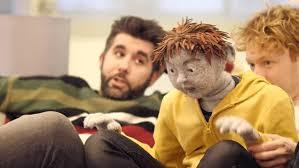
All In A Row
Don’t you just hate it when you’re expected to parent your autistic child? Like actually show love and care and consideration to your offspring. Look at him, expecting you to treat him like a human being. Selfish bastard! If only there was a play that explored the horrors of having to be a decent person to your own flesh and blood and how objectively awful it is. If you’re one of those people, then the play All In A Row will be right up your street.
Premiering on the 14th February at Southwark Playhouse in London, All In A Row was a total shitshow to say the least. The playwright, Alex Oates, claimed to have ten years of experience working with autistic children, which you wouldn’t have believed if you saw the play as the autistic child at the centre of the play, Lawrence, seemed more like a wild animal than a person. In fact two of the main characters compare him to a dog. And if you thought this wasn’t dehumanising enough, Lawrence isn’t even a child. He’s a puppet. Yes, it’s as bad as it sounds.
All In A Row seems to place all of the blame for the family’s predicament on the autistic child, who’s presented as barely functional, bordering on bestial. There’s no effort to really make an emotional connection with Lawrence (how can you? He’s a puppet!) as the play instead focuses on how this kid has effectively ruined this family’s life because of his autism and aggressive behaviour. Speaking as someone on the autism spectrum, I can say quite confidently that this play is fucking despicable. Badly written, badly conceived, insulting and downright mean spirited. I wouldn’t want Oates looking after my autistic children, that’s for damn sure.
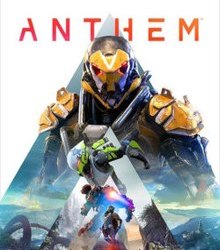
Anthem
EA is back and this time they’re dragging the critical darling that is BioWare down with them.
Anthem was a desperate attempt to jump aboard the ‘live service’ bandwagon, trying to replicate the success of other video games like Overwatch, Destiny and Warframe. They failed spectacularly. The game itself had more bugs than A Bug’s Life, loot drops were often stingy and unrewarding, loading times were farcically long, and the story and worldbuilding was fucking pitiful. Oh yeah, and if you played it on PS4, there was a good chance it could permanently damage it. Thankfully I have a uni friend with an Xbox One and they allowed me to play the game on that. It was a crushing disappointment, especially coming fresh off the heels of Mass Effect Andromeda, which didn’t exactly set the world on fire back in 2017.
It didn’t help that EA’s reputation was in tatters thanks to the lootbox controversy of Star Wars Battlefront II and having to try and win back the trust of fans, but worse still reports began to service of what went on behind the scenes at BioWare during the game’s development. Apparently the game’s story and mechanics kept changing every other day as the creative directors and writers didn’t have the faintest idea what kind of game they wanted to make, and the developers were often forced to work obscenely long work hours in abusive crunch periods to get the game finished for launch. It got so bad that, according to an article on Kotaku, some members of the team had to leave for weeks or even months at a time to recover from ‘stress casualties.’
To think this was the same company that gave us Mass Effect, Dragon Age and Knights Of The Old Republic. Thank God that Obsidian Entertainment is there to pick up the slack on the RPG front because I think it’s safe to assume that BioWare won’t be around for much longer at this rate.
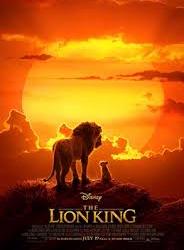
The Lion King (2019 remake)
Here we go. Yet another live action remake of a Disney classic. Excpet it’s not live action, is it? Well... it’s live action in the sense that Dinosaur was live action (remember that film? Don’t worry if you don’t. No one does). Real locations but CGI characters. Millions of dollars spent on cutting edge tech to create photo realistic animals... and the film ends up duller than a bowl of porridge that really likes trainspotting.
It’s not just the fact that The Lion King remake is yet another soulless cash grab from the House of Mouse, it’s also the fact that it’s done really badly that upsets me. The Lion King works as an animated film. Bright colourful images, over the top song and dance sequences and vibrant character designs. As a ‘live action’ film, it just looks awkward and stilted. None of the animals are very expressive, leaving it up to the poor voice actors to carry the film, and to cap it all off the CGI isn’t even all that convincing in my opinion. At no point did I look at Simba and go ‘oh yeah, he looks like a real lion.’ It’s so obviously fake. In fact it reminds me of those early 00s movies like Cats & Dogs or Stuart Little where you see the jaws of the talking animals moving up and down like some messed up ventriloquist act or something. And here’s me thinking cinema has evolved past this.
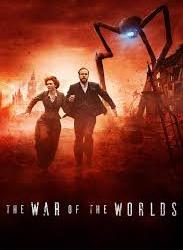
BBC’s The War Of The Worlds
Remember Peter Harness? That guy who wrote that Doctor Who episode about the moon being an egg? Yeah, he’s back and he’s doing an adaptation of H.G. Wells’ War Of The Worlds. And guess what! It’s fucking ghastly! :D
The three part BBC mini-series was without a doubt some of the worst telly I think I’ve ever seen. It’s staggering how clueless Harness is as a writer. For starters he managed to achieve the impossible and somehow made a Martian invasion of Earth boring. I didn’t even think it was possible, but somehow he pulled it off. Then he sucks all tension out of the story by revealing the ultimate fate of the Martians at the beginning of the second episode, so now any threat or danger has been chucked out of the window because we know that the main female protagonist Amy at least would survive. And then finally he takes a massive dump over the source material by having humanity weaponise typhoid to kill the red weed rather than just having the Martians die of the common cold like in the book. Because God forbid us Brits should be presented as anything other than heroic and dignified.
So what we’re left with is a poorly realised allegory with ineffectual horror tropes full of OTT progressive posturing in a pathetic attempt to make Harness and the BBC look more liberal than they actually are. There’s no effort to really explore the themes of imperialism and colonialism outside of casual lip service, and we barely get a glimpse of the dark side of humanity. Everyone is presented as flawed, but basically awesome or, in the case of Rafe Spall’s character, utterly gormless. Our TV license fees help fund this shit, you know?!
And if you think this was bad, just wait till New Year’s Day where we’ll get to see Steven Moffat and Mark Gatiss’ butcher Dracula. Can we stop giving these beloved literary icons to these hacks please?
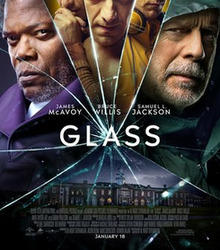
Glass
I liked Split. It wasn’t an amazing movie, but it was entertaining with some good ideas, a great performance from James McAvoy and was a true return to form for M Night Shyamalan. That being said, I wasn’t keen on the idea of it taking place in the same universe as Unbreakable. I feared it would be a step too far and we’d end up having something like... well, something like Glass.
On paper, Glass isn’t a bad idea. The idea of superpowers being a delusion is legitimately intriguing and could have been a great post-modern deconstruction of the superhero genre. Except Shyamalan never actually does anything with it. The first act drags on and on with absolutely nothing happening, none of the characters really grow or change over the course of the film, Bruce Willis in particular is basically only here for an extended cameo as his character does pretty much nothing for the majority of the film, and then the entire film is undermined by that stupid Shyamalan twist. Turns out superhumans are real and there’s a big cover up. Oh great! So not only does it render the entire film pointless, it also undoes what made Unbreakable and Split so good. They’re no longer people capable of extraordinary feats via rational means. They’re just superhuman. They can do anything. Sigh.
Shyamalan... maybe it’s time to give up the director’s chair, yeah?
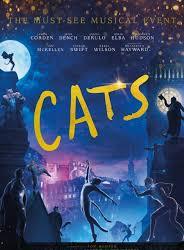
Cats
Oh come on! Don’t act surprised! Did you honestly think I wouldn’t put Cats on this list?!
Cats, without a doubt, is the worst film of the decade and, yes, the CGI is terrible. Not only are there these sub-human cat mutants running around, we also have mice and cockroaches with child faces, James Corden coughing up furballs, Taylor Swift trying to give the furries in the audience boners, Idris Elba looking disturbingly underdressed and Rebel Wilson being... well... Rebel Wilson. It’s a disaster of a film. And really, should we even be surprised? We all knew this was going to suck. And no it’s not because of the CGI. I thought the CGI in Pokemon: Detective Pikachu was creepy as well, but at least it had a decent script and good performances to back it up. No the reason why Cats sucked is because... it’s Cats. It’s always been that bad. No amount of ‘advanced fur technology’ was going to change that. It was still going to be a confused, plotless mess with one dimensional characters and bad songs.
The only consolation I had was that I didn’t waste money buying a ticket. A friend of mine snuck me into the premiere and we watched it in the projector room. The plan was to make fun of it and have a laugh, but we didn’t even do that because honestly there’s nothing to really make fun. There’s only so many times you can take the piss out of the CGI and honestly the film was just boring more than anything else. It doesn’t even have the distinction of being so bad it’s good like Sharknado or Tommy Wiseau’s The Room. It’s just bad, period.
I just hope we don’t see something similar happen to Starlight Express. Just think. Anthropomorphic, singing trains on roller skates. Shudder.
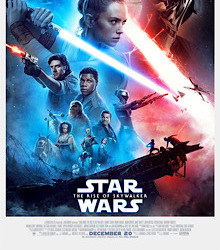
Star Wars: The Rise Of Skywalker
Finally we have yet another cynical cash grab from Disney.
I confess I didn’t exactly go into The Rise Of Skywalker with an open mind. I was never all that keen on a sequel trilogy in the first place, and neither The Force Awakens nor The Last Jedi ever convinced me otherwise. Admittedly they weren’t bad movies. Just derivative and painfully uninspired, and I was expecting more of the same for Episode IX. What I got instead was quite possibly the worst Star Wars film since Attack Of The Clones. Yes, it’s that bad.
This film is very poorly made, filled with plot contrivances and logic holes galore. I lost count of the number of times the protagonists got into a dangerous situation because of Rey constantly wandering off like a confused toddler lost in a shopping mall. Oh and we finally find out who her parents were and it was quite a twist, but only because it was really stupid. Of course we didn’t see it coming because nobody would have guessed it would be something that moronic. I feel JJ Abrams’ stupid ‘mystery box’ philosophy is to blame for this. It’s derailed countless franchises before such as Lost and Cloverfield, and now Abrams has fucked up Star Wars because he’s obsessed with mystery for the sake of mystery and Disney are so lazy that they couldn’t be bothered to plan an actual trilogy out properly beforehand. Instead they just wing it, making it up as they go along, which led to Rian Johnson ‘subverting our expectations’ and left Abrams desperately trying to pick up the pieces.
In fact a lot of The Rise Of Skywalker seemed designed specifically to appease people of both sides of the wide chasm The Last Jedi had created. The roles of characters of colour like Finn and Rose were significantly reduced, Poe and Finn don’t end up together because of homophobia, but we do see two women kiss in the background of one two second shot that could easily be cut out when they release the film in China, Kylo Ren gets his stupid redemption even though he hasn’t fucking earned it, Lando Calrissian shows up for no fucking reason, Rey is given ‘flaws’ relating to her parentage in order to combat those accusing her of being a Mary Sue, but they’re the boring kind of flaws that don’t have any real impact on her character, and that ghastly ship Reylo is made canon even though it makes no sodding sense in the context of this movie, let alone the whole trilogy. They even go to the trouble of baiting us with a FinnRey romance before pulling the rug out from under us. Then, just to add insult to injury, the film retroactively ends up making the entire original trilogy completely pointless. All because Disney wanted more dollars to put in their Scrooge McDuck money bin.
The Rise Of Skywalker, and indeed the entire sequel trilogy, should serve as a cautionary tale against the dangers of hype and nostalgia. The reason The Force Awakens was successful wasn’t because it was a good movie (because lets be brutally honest here, it really fucking wasn’t). It was because it gave gullible Star Wars fans warm fuzzies because it reminded them of A New Hope whilst tempting them with the vague promise that things might get more interesting later on. And when that didn’t materialise, quelle surprise, the fanbase didn’t take it very well. I would love to think that this will serve as an important lesson for the future when people go and see Disney movies, but who am I kidding? I guarantee at some point we’re going to get Episodes X, XI and XII and we’ll have to go through this sorry process all over again.
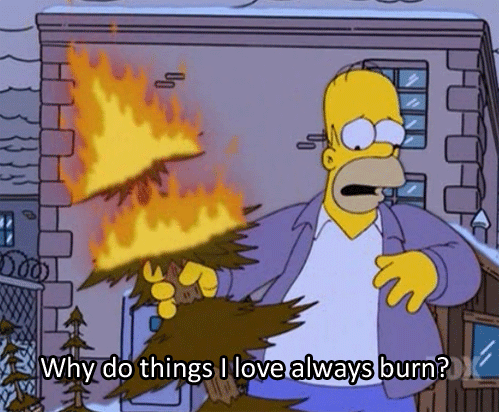
So there we have it. The worst of 2019. May they rot forever in Satan’s rectum or wherever it is stories go to die. Tomorrow we’ll take a look at the other end of the spectrum. Yes it’s the Quill Seal Of Approval Awards! The best of the best! Who shall win? The suspense is killing me! Ooooh, I can’t wait! You’ll be there tomorrow, won’t you? Of course you will. How could you not?
26 notes
·
View notes
Photo

❝ AND WHAT ABOUT ME, MOM? WHAT ABOUT THE DAUGHTER WHO'S STILL HERE? LYDIA WAS TAKEN BUT YOU? YOU LEFT. ❞
— PARS UNA: the rumbling.
Lucky doesn’t want to believe the rumors floating just outside her social circle. Her mother’s name is one very few dare to utter to the actress’s face but they certainly didn’t mind mentioning her behind her back from time to time. Lately however it seemed to be on the tip of everyone’s tongue. Lorraine Jacobs, playwright extraordinaire, back on the West coast to turn one of her infamous plays into a motion picture. At first it felt too outrageous to be true. Lorraine Jacobs hated Hollywood and she’d sworn to never step foot in Los Angeles county again regardless of it being where her children resided and yet it was all true.
She couldn’t be sure what hurt more that her mother moved back for a job opportunity rather than to mend faces or the fact that she had to find it out through complete and utter strangers congratulating her for the early Oscar buzz her mother’s play turned movie was getting. By the time Lucky’s manager sat her down with news that the director assigned to the project was interested in screen testing her for a part she had already reached her limit. “Excuse me?” She all but shrieked manicured fingers digging into the expensive leather of his couch. “You’ve got to be fucking kidding me. No, no, fuck no.” What exactly was her mother thinking? That she could make up for years of abandonment by spoon feeding her daughter a role in her movie? Did she really think so little of her own flesh and blood?
“Luce, listen, I know how you feel about your mother but this is a golden opportunity,” Jonathan attempted to reason, large hands reaching forward to engulf the one angrily tapping on the surface of his coffee table. “Even if the role you're given is small, it’ll do wonders for your career. It could be the big break you were looking for.” It barely takes her any time at all to pull herself out of his grasp. Her slender frame ricochets from the couch, golden hues burning as they search for the purse she’d abandoned somewhere in his office during their weekly meeting. She should have known something was up when he offered to read through scripts with her rather than just handing her a stack of them and sending her off. “How many times do I have to tell you that I want to earn my big break?” The question leaves her laced in thinly veiled venom. Disappointment etched into her features just as she finds her abandoned bag by a half-dead fern.
“I don’t want it handed to me because my father knows someone or because my deadbeat mother rolled back into town and wants to rid herself of some guilt. Now if you’ll excuse me I have somewhere to be.”
— PARS DUORUM: the explosion.
How she managed to track her mother’s location couldn’t be spoken for. In fact much could be said about the last hour and half of her life. It passed by in a blur of was anger, hurt, and sheer force of will to hunt down the person responsible for her current less than pleasant head space. Ironically enough her mother had only been located fifteen minutes away from the set Lucky traveled to each day. Some may have been comforted by the knowledge of their mother being so close but it only fueled her anger. Tinder to the ever growing fire within the pit of her stomach. Lucille barely gets through the small talk it takes to trick the front desk into providing her a key to her mother’s room and the entire elevator ride up to the woman’s hotel suite is spent perfecting the monologue she had pieced together in the car ride over.
“Who the hell do you think you are?” Lucky demands to know the moment her mother swings open the door. She crosses through the threshold without permission, brushing past the older woman with more force than needed. “You can’t just waltz back into town expecting to placate me with a role in your movie. Don’t tell me you think that makes up for a decade and a half of skirting your duties as a mother?” There isn’t a pause long enough for Lorraine to answer, like an automatic with a finger on the trigger, the words kept spewing from her mouth. “You know what’s so funny to me?” Lucky continued, the laugh following her question far from one of amusement. “ You didn’t even have the balls to offer me the role yourself. You had to do it through the director.”

The last couple words spill from pink painted lips in a sneer. Her gaze wild and angry as she runs her fingers through wavy brunette trusses not unlike the style being worn by the woman before her. She can feel the tears building up beneath her lids and attempted to will them away. The last thing Lucky wanted to do was shed tears in front of her mother. Even if they were ones caused by years of built up rage. “I’m not sure what you thought you would accomplish by coming back here but,” it’s then Lucky finds herself cut off for the first time since her abrupt entrance.

“I’m trying to accomplish a movie. That’s it. I’m sorry you worked up all this courage to come here and yell at me but your anger is misplaced.” If Lorraine’s intention were to calm her daughter down the sound of her voice seemed to be having the opposite effect. “If you got approached by anyone to do this movie I can assure you that it wasn’t my doing. In fact I strongly advocated against it.” Girl Rising had been a biographical play based on Lorraine’s real life. Once it became apparent that the success of the play could be repackaged into a successful movie she had been hounded to sign the rights away. Unable to part completely with something so personal she managed to negotiate a position for herself as co-screenwriter which gave her full control of the script but little control anywhere else.
When producers began to suggest that her daughter play the titular role as a gimmick to get even more eyes on the movie she had done her best to steer the conversation elsewhere but it seemed that her suggestion of other names hadn’t been enough to rid them of the idea completely. Hesitantly, as if she were holding out for Lucy to decide to leave, Lorraine shut the door behind the hurricane otherwise known as her estranged daughter. She maneuvers past Lucille to head directly to the mini bar. She needed something to subdue the headache forming in her temples. “You’re not going to take it right? It would make things extremely difficult for me in you did.”

Her mother might as well have slammed one of her Tonys into Lucky’s chest, it would have hurt a lot less than the damage being inflicted upon the actress’s heart by the callously dismissive words of the woman. In fact I strongly advocated against it. The statement repeats itself within her subconscious, ripping through her psyche much in the similar fashion to that of runaway freight train. How naive could she have been? Of course Lorraine wasn’t capable of extending an olive branch. She barely seemed capable of looking Lucky in the eyes since the disappearance of Lydia. Embarrassment floods through her system, olive features falling into expression devoid of any emotion as hazel hues silently watch the older version of herself cross the room. She barely manages to process the blow inflicted to her ego by her own mother before the woman delivers yet another.
“You’ve got to be kidding me,” she’s quieter now, her response barely above a whisper. The anger she had entered with suddenly depleted along with most of her energy. Slender shoulders slouch forward, the invisible weight against them threatening to crush her as her mind attempted to pick up the pieces of her heart in real time. She doesn’t mean it, a small voice promises somewhere from the labyrinth of her wounded soul. She loves you, she does, it continues to urge sweetly. All pretty lies meant to sooth her and maybe they may have if it weren’t for the cold gaze in her mother’s eyes as she waited for a response. It was easier to convince herself that the woman who brought her into the world actually cared for her when she wasn’t right in front of her looking anything but the loving mother of her memories. “It would make things difficult for you?”
“Is that all you care about? Yourself?”
“Don’t be dramatic, Lucille. I didn’t mean it like that.”
“But you did mom, you did.”
God, Lorraine made it so easy to be hated, so why was it that even after all these years Lucky searched desperately her approval? Her love? Any ounce of affection she could drain from the seemingly cold hearted woman left in the place of the mother she once knew. She hadn’t always been so dismissive, cold, cruel and sometimes Lucky couldn’t help but wish that she had been. If she had been a monster from the start then maybe the actress would have been spared the heartbreak of losing a mother. “I've been making excuses for you my whole life and I’m tired. I’m so tired,” her voice breaks with the declaration. Resolve wavering the longer she stays in the presence of her Achilles heel. Hot tears spill over flushed cheeks as shaky fingers pick at the fabric of her skirt. “I can’t imagine the pain of losing a child and I hope I never do but what about me, mom? What about the daughter who’s still here?”
It’s a question she never dared to utter before this moment, yet as she spoke it she knew it had been one that haunted her ever since the departure of her mother all those years ago. “Lydia was taken, but you? You left.” Her sister held no blame in her departure from Lucky’s life, her exit had been forced upon her. Lorraine Jacobs on the other hand chose to leave Lucky behind and never look back and in the end that had done more damage to her heart than her twin sister’s disappearance ever had. “I never gave myself permission to hate you because I knew you were hurting but why should I care anymore? You clearly don’t care when you hurt me, so you know what?” Lucky asks as she lifts a hand to wipe away at her tears. “I think I will accept the offer to screen test for the movie. Consider it karma for being such a shitty mother.” With nothing else to say and no stomach to stick around long enough to allow her mother enough time to retaliated the actress spun toward the door and made her second dramatic exit of the day.
#𝒇𝒊𝒍𝒆𝒅 𝒖𝒏𝒅𝒆𝒓 ━━━━━ * ∗ ∵ ▸ selfparas.#𝒇𝒊𝒍𝒆𝒅 𝒖𝒏𝒅𝒆𝒓 ━━━━━ * ∗ ∵ ▸ featuring.#𝒇𝒊𝒍𝒆𝒅 𝒖𝒏𝒅𝒆𝒓 ━━━━━ * ∗ ∵ ▸ lorraine jacobs ( mother dearest ).#guess who misses the dash & is feeling musey af#almost 2k words of just pure word vomit#but anyway time to finish nadia's sp#<3#kidnapping tw#child loss tw#horrible parent-child relationship tw
5 notes
·
View notes
Text
Burn This – A Review in Thirst, Energy and Hilarity
When @leofgyth offered me to go with her and a group of friends to see Adam Driver star in Burn This on Broadway I was ecstatic. Go see our fave in person and hang out with some fellow Adam Stans/Reylos? Hell yes. Also, there be spoilers ahead so BEWARE.
So, in preparation I bought a copy of the play. I read if four times before seeing it Saturday night. Mostly because Jimmy, aka Pale – Adam’s character has dizzying monologues that rail and race along a rollercoaster of emotion that on the page make them hard to follow. I knew though, instinctually that Adam would pull off the dizzying effect to great degree.
The house music was all 80s great new wave hits that set the right tone. From Manic Monday to Voices Carry. I was immediately transported to a time when I was too young to remember much aside from the music blaring from my mom’s record player.
Now I don’t want to spend this entire review thirsting after Adam. Because believe me, no one who goes into that play comes out not thirsting to some degree. I’ll get to him soon. But first I really want to talk about the other three characters in the play. What they brought to it. How they fared up against Adam’s intensity and undeniable energy.
First up, let’s talk about Burton. He’s Anna’s off and on boyfriend. He’s a screenwriter, rich, successful, born with a silver spoon in his mouth. He’s enamored with Anna despite the fact that they seem more square peg-round hole as a pairing. He’s funny, however. His entire monologue about how there are no good movies in Hollywood and how everything gets remade every ten years is hilariously accurate even 32 years after the initial Broadway run and just goes to show that not much has changed three decades.
Burton is flawed. Entitled. Spoiled. Not used to understanding the financial struggles that Anna and Larry have gone through. But he has a good heart despite himself. He’s played by David Furr, who is almost as tall as Adam, and pretty fit too. He’s a big guy with a teddy bear like quality about him that makes you feel comfortable in his proximity. He brings that sort of energy to Burton and you kind of feel for the guy that he is the supporting lover who gets passed over and not the romantic lead. His interaction with Pale is limited to one scene of spectacular inebriated fighting and revelation. His interactions with Anna are soft, and bring out his insecurity as a writer, and the rambling disjointed way he describes his ideas hit home for a writer like myself.
Let’s move on to Larry. Oh Larry. He’s gay. A marketing exec. And dear fucking GOD he is the hidden gem of this play. I went in expecting excellent performances from Keri and Adam and they no doubt delivered. Larry consistently stole scenes from every fucking cast member, Adam included. He was so funny and his timing and delivery were perfection. From him flopping himself down on the sofa whilst playfully calling Anna a slut for fucking Pale. To him singing the song Pale sings to her to tease her about hearing the entire tryst. To his reaction to Burton’s story about getting blown by some rando guy in the snow in his twenties. To the call back to that moment with something along the lines of “Hey Burton, look, it’s snowing, wanna find a dark doorway?” He’s cheeky and enigmatic and loves Anna with a brotherly protectiveness that is so lovely. Brandon Uranowitz is the actor who plays him and he’s a delightful surprise. When I read the play I was paying far more attention to Pale and Anna’s connection than to the wise cracking gay man she lives with. Definitely pay attention to him if you happen to be going to the play. He’s so wonderful.
Now let’s dish on Ms. Russell. At first blush you can tell she is really starting to get her bearings as a stage actress. To be frank, stage acting is very different than screen acting. You have to emote more, you have to be slightly over the top to ensure that even the person in the last row can feel the intensity of emotion you’re displaying. Whereas on a screen it’s easier to be subtle and still have the same effect. What bits of her acting style have changed since she’s started the play have shown through and shine through a beautifully nuanced performance that not even two unscripted improvisations by Adam Driver could completely throw her out of character for more than a split second to give him a “Are you fucking kidding me?” look a chuckle and then move on. She gives emotion and vulnerability as well as a gigantic emotional brick wall around herself as Anna as both Pale and Burton try to bust it down. With only Pale who is the one to break through.
She walks herself through grief. Anger at Robbie – her dance partner who dies suddenly and is the emotional center of the play as she tries to move from being a dancer to a choreographer. Desperation for connection – with Burton – only to shove him away when his enthusiasm and compassion become too much. To her frightened exchange with Pale upon their first scene together to how he busts down her walls and makes her reach out to comfort him through his pain of losing his younger brother. She holds her own against Adam’s explosive performance. She has her own moments that are just as gut wrenching but in her you feel the tight containment of her discipline as a dancer that beautifully juxtaposes Pale’s explosive grief.
I knew going to see Adam would be an experience. Having seen his performances on the big screen and the small screen I knew this was a role he would both love and find so much meat to sink his acting chops into. This is Adam at his finest. He’s an emotional trainwreck throughout the play. In his first scene he steals the audiences attention, commanding it as he paces like a caged animal, ranting about parking and pot holes, and Ray the bartender who he decked out for not shutting up to full on the floor, full body sobs with real tears and screams of grief. His dialogue is dizzying and circular, coming back around several times with the same questions. He plays inebriated, drunk, coke high and belligerent with an authenticity and veracity that makes it almost too real. Pale has no filter. He thinks it he says it. Bluntly. Boldly. It’s the exact kind of snark and sass that Adam is becoming famous for a la Adam Sackler in Girls and the explosive anger of Sackler and his even more famous character Kylo Ren/Ben Solo of the Star Wars franchise. His physicality and range of emotions in his opening scene is enough to give the audience emotional whiplash.
His acting ability in person is even more powerful than it is on the screen. You feel the emotions he sends out as a wave of energy that engulfs and enslaves the room. We laugh at his snark and quick wit, but the audience grows quiet as Pale begins to work through his intense grief. There’s a humanness to Adam’s style that makes you believe that he is not just some actor playing a part but that he IS Pale in those moments. That type of immersive acting is something I personally will never forget and am so grateful for seeing in person.
Physically, I didn’t think Adam could get more attractive than I had seen in photos, tv and movies. Oh boy was I wrong. Every review I read. Every interview with female costars I’ve read. All of that previous knowledge did nothing to prepare me for the reality of seeing him in person. The minute you hear his voice, yelling just offstage for Anna to let him in at five in the morning, the hair on the back of your neck stands up because you know an entrance™ is about to be made.
Bursting on stage he gets uproarious applause from the audience as he launches into his initial rant about pot holes, and finding parking in a city that’s dying of crotch rot. He’s so good at going from 0-100 on the emotional scale at the drop of a hat that it’s startling to witness in the same room.
From him taking off his pants to not wrinkle them your eyes immediately go to the stark contrast of his pale legs against the black socks, shirt and underwear. Or to him gliding out of Anna’s bedroom on his second visit there in her purple floral silk kimono (that he ripped the sleeve of rather accidentally) with it open to reveal more pale skin and tiny euro black briefs that made the entire audience audibly inhale. Adam’s costumes throughout the play go from sleek suits to the fun comical use of a woman’s robe to a leather bomber, jeans and shitkickers. His stage presence and physical form is a veritable feast for the eyes as his voice, intonations and blue collar diction is just as entertaining. He improvs as I mentioned before, once when he did a little twirl that seemed like it was extremely on the fly, an amused smirk on his face as Keri almost broke out laughing. And again, when they’re on the sofa together and he did something that surprised her but I can’t quite pinpoint what that was having only seen the play once.
All in all this is a play where nothing happens and everything happens. Four people processing grief in varying degrees. From Larry and Anna’s personal grief as Robbie’s found family, to Pale’s outrageous self-destructive spiral and Burton’s tangential disconnected sympathy. It makes Burn This and Lanford Wilson’s prose jump from page to stage with veracity and life that I think would make the playwright proud.
75 notes
·
View notes
Text
An Interview With Screenwriter Louisa Rose
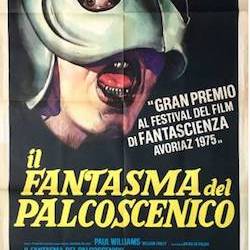
In 1973, Brian De Palma released Sisters, his Siamese twin mystery thriller starring Margot Kidder and Charles Durning. After a string of social satires which, to be honest, haven’t aged very well, Sisters was De Palma’s breakthrough film, the one that would cement the form and style for which he’d come to be known. A year later he released the horror/comedy/glam rock opera Phantom of the Paradise starring the great Paul Williams. Hitting theaters more than a year before Rocky Horror, Phantom combined elements from Faust, Phantom of the Opera and about a dozen other sources into a bright, fast, wicked comic book satire of the music business. The film went on to become a cult favorite.
Both films were written by screenwriter Louisa Rose, though she is rarely credited for her work on Phantom. After some reputed and proverbial creative differences, De Palma removed her name from the film and rewrote the script, taking sole screenwriting credit. Although Rose disagrees with me, I think it can be argued it was her work on these two scripts, particularly Sisters, that drew attention to De Palma as a director.
After spending the first 20 years of her adult life in New York City, she and her husband relocated first to Spokane and then to Seattle about a decade back. Not long ago, I spoke with her via phone about her career as a playwright and Hollywood screenwriter.
Jim Knipfel: How did you get started in screenwriting?
Louisa Rose: {Laughs} By accident. I was one of those kids who wrote poetry in high school. I went to college thinking I wanted to be an actress. Theater was my primary interest. I found that I really enjoyed the rehearsal process, but really did not enjoy acting for an audience. That was not a recommendation for a career on stage, so part of my theater concentration (we called our majors “concentrations” at Sarah Lawrence) was writing for the theater. And that’s what I really loved. Brian De Palma was at Columbia, and though they had extra-curricular student theater, they did not have the intensive program as part of the curriculum that SLC did, and does.
At any rate, Brian and another Columbia student came to Sarah Lawrence to do theater and some film projects, because the head of the theater department, Wilford Leach, was interested in film as well. He was a mentor for Brian. The first film project, I believe, was a short piece called The Wedding Party. I don’t know if you’ve heard of that.
JK: Oh, yes, I’ve seen it.
LR: After that Brian made Murder a la Mod and Dionysus, I think it was.
JK: You mean Dionysus in ’69?
LR: Yes, Dionysus in ’69 started out as a theater piece. Scared the shit out of me when I went to see it. It was created by an interesting experimental director, Richard Schechner, as a mass quasi-orgy experience. The venue, The Performing Garage, had stadium seating, actually more like large long shelves almost to the ceiling – and you had to climb ladders to reach them. Then the actors would climb up and invite you to “join the dance.” And I saw one coming toward me… “No, I am not joining the dance. I am an observer” {laughs}.
Brian did his Masters at Sarah Lawrence, and one of his projects was to direct my senior play. That’s how I got to know him. I then went on to get my MFA in theater. So he knew me and he was looking for someone to write a script for Sisters. He felt his idea for the film would be marketable, but he needed a script. It sounded like fun, and actually became my Master’s thesis.
JK: Really?
LR: Yeah, so that’s how I got to work on Sisters.
JK: So he came to you with the story?
LR: He had kind of an outline. He had this idea that it would be twins, one evil and one good sister…You know, it’s just so long ago it’s hard for me to remember. There were certain points, certain visual things he wanted. We worked together on the story, and then I wrote the script.
As for Phantom of the Fillmore …
JK: Um, you mean Phantom of the Paradise?
LR: That’s it, Phantom of the Fillmore. It became Paradise.
{Note: After catching wind of the film’s original title, the owners of The Fillmore filed a lawsuit, forcing the change. Another lawsuit, this one filed by Led Zeppelin, forced the name of the films central record company, Swan Song, be changed to Death Records.}
LR: I took time off from working in NYC to go to LA and write scripts for Sisters and Phantom. At that point, I was a single mother, and my daughter Alissa was two and a half. I brought her with me and had her in day care. I had a contract for a total of $80,000 for the two scripts. But when it came to getting paid, Brian delayed and delayed, told me it was not a good time and that I needed to wait. As usual, actors, director, camera persons, etc. were paid. I needed the money, had to sue to be paid, and only received a quarter of the contract money. Brian had been a friend, and it felt like a betrayal.
But back to the movie, what is your take on Sisters? What are the things you notice about it?
JK: I went back just a couple days ago and watched it again. Just in terms of De Palma’s career, it was a big turning point for him. Discounting Murder A La Mod, he’d been doing all those goofy satires like Greetings and Hi Mom! And Get to Know your Rabbit. Sisters was the first of his thrillers and the first of his Hitchcock homages, the things he’d come to be known for.
LR: Right.
JK: Ignoring the Psycho model at play, one of the things that always struck me about Sisters was that in lesser hands the big Siamese twins reveal would have been saved until the last ten or fifteen pages of the script, but here we get it about forty minutes in. Even before that, they gave it away in the poster; they gave it away in the tagline. There was no secret the killer—or killers—were Siamese twins. But then of course there’s the later twist, which brings us back to Psycho.
LR: Mm-hmm.
JK: What really sticks with me, though, is the whole final sequence from Jennifer Salt’s hypnotism to that final shot of Charles Durning staring through the binoculars at the couch. It’s so good. I love that ending so much. Also, having come to know of her only later, I was amazed to see what a good actress Margot Kidder was.
LR: I thought she was very appealing and a really good choice for the part.
JK: In the end Sisters, more so than the thrillers that would follow—Dressed to Kill, Body Double, Blow Out—is the one I always go back to, because even the Hitchcock stuff is still fairly understated at that point. So I’m wondering, how much of that final script, what made it to the screen, was yours?
LR I think I have a copy of my original script here, if I could find it. It was much longer and needed to be cut. I really don’t know. It was a long time ago and I’d need to re-read it.
There is a Blu-Ray copy of Sisters put out by Arrow that has interviews of some people who worked on the film.
I’ve got it somewhere.]
My husband keeps saying I should show it to our teenage grandchildren, but it might destroy their image of me as nice old grandma. On the other hand, some years ago, our two nephews watched it as young teenagers and looked at me with new respect—or was it fear?
Now, what is funny is that Sisters is kind of a cult film, and so is Phantom. About ten years ago, shortly after we moved to Seattle, I got a call from a young woman originally from Winnipeg.
JK: The one city where Phantom was a big hit when it came out.
LR: Yes, it was a cult film there, with a festival and now possibly a documentary about the festival. We had a visit, and she mailed me – I believe it was a production copy of the script for Sisters.
JK: So what was it like for you, a young woman writing films in the Seventies?
LR: There are things funny and not funny that happened…Nothing about the movie business appealed to me, based on my very limited experience. The people were kind of awful. I have memories of someone from the studio, a married accountant. He said, “Oh, I have to go to San Francisco to scout locations, and you could come with me.” The whole approach was making me nervous, and I said, “Well, I have a two-year-old daughter with me, so, uh, no I can’t do that.” And he said, “Well, we could bring your daughter and get baby-sitting for her, and then we could have a Really Good Time.” I thought, oh, just leave me alone—I’m not a gorgeous actress, I’m a writer.
JK: Not that long ago I interviewed an actress from the late Fifties who up and left the movie business for twenty years because she wouldn’t put up with that.
LR: Women were treated horribly in Hollywood as elsewhere. When I went to look for a job in New York after college, there were separate job listings for men and women. Men could apply for management-track jobs and women could be a “Gal Fri” or a “Secy.”
I was very taken by a piece in Ms. Magazine about a woman who worked in a factory that made plutonium pellets and who became a whistle-blower. I thought it would make a good movie.
JK: You mean Karen Silkwood?
LR: That’s it. So I met a woman who worked at New Line Cinema, who got me an interview with a producer there. I came in and I was supposed to pitch my idea. It was almost like a parody of a scene in a Hollywood movie about a Hollywood movie. The guy is sitting there with his feet up on the desk and he has these three or four male cronies sitting around, and he’s cracking jokes and they’re all laughing heartily at his jokes. Eventually he said, “So you want to write a script,” and I said “Yeah.” I started telling him about it, and he kept interrupting me. He was horrified to learn that Karen Silkwood, a single mother, had left her children with their grandparents so she could take a well-paying job at the plant. “No one would ever go to see a movie about a woman who leaves her children,” he announced. Basically, the interview was over at that point. He looked at me and asked if I knew how to type. When I said yes, he said,
“Well, you could come and be a typist here.”
JK: My god.
LR: At that point, I said, “I think you’ve really got too much going on here to pay attention, so I think this isn’t working too well.” He sprang up from his desk and stalked off, bright red, furious. He came back and said, “I have never been so insulted in my life.” That was the end of that. {Laughs.}
{Note: For what it’s worth, Rose’s instincts were good. Director Mike Nichols’ take on the Silkwood story, starring Meryl Streep and written by Nora Ephron, was released in 1983.}
LR: Then, because I’d written a horror movie, I was offered other projects. One was to be a murder film involving Debbie Harry, the lead singer with Blondie, the rock group. The only requirement as far as the potential director was concerned was that it needed to have seven or eight murders. The rest was up to me. I met Debbie Harry and talked to her to get a sense of what she could do. You just get a sense of what people can do. She had no acting background.
JK: Would this have been her first picture?
LR: It would have been, I think, but it was never made. At one point, she said “Well, I just want to play the part of a housewife in the movie.” And I thought she’d be more believable as the person she actually was. So I made it about a rock group beset by a number of murders. I think it had seven murders. Then I came back for the next meeting. She’d read the script and said, “I can’t do this movie; it’s the story of my life.” And I thought, WHAT? {Laughs.}. I mean, WHAT? So that one didn’t happen.
JK: So that was, what, around 1980?
LR: I think so, late Seventies or early Eighties. Something like that.
JK: So that was after Monique was made?
LR; {pause} So you know about that.
JK: Yes.
LR: How did you find out about that?
JK: Well, it’s listed on your filmography online, and I’ve seen it.
LR: {Sighs heavily and laughs} It has very little to do with me. Believe me, I’ve seen it also. That’s the thing about screenwriting. Who knows? You sit at home and do your writing, but who knows what will emerge?
I was hired by a French would-be feature film director who had done film work for a famous French fashion house. He wanted a story about a woman who becomes psychotic when she learns her husband is gay and proceeds to murder a bunch of gay men.
I don’t recognize the script part of it and wish I didn’t have a credit on it. It’s one of the worst things I’ve ever seen, and I think you can agree with me.
JK: I was going to hold my tongue.
LR: Well, don’t.
JK: It was pretty bad. But I will tell you, it is extremely hard to find nowadays.
LR: Good.
And then there was the time an agent called and said she had a project for me, and that I didn’t have to do my best writing; I could do my second best writing.
JK: That sounds promising.
LR: Well as a writer if someone called and said they had a project but that you’d only have to do your second-best writing, what would you say?
JK: I think I’d ask how much it paid.
LR: But what would be you’re “second-best writing”? It’s like we have it in categories. It’s like, do I want Double A grade eggs? Should they be certified, “humanely raised”? Or do you just want ordinary eggs? How do you apply that to writing? Sure. I can write bad scenes, but I don’t have a special price category for them.
There was another project that I thought was extremely funny. Somebody, God, I can’t even remember who it was anymore; a producer had bought the rights to The Sensuous Woman. Have you heard of that one?
JK: Oh, sure, yes. It was a huge bestseller back then.
LR: It was written by someone only identified as “J” at the time and was supposed to be an advice book. I think one of the funniest suggestions was supposedly made by a woman who found she could have an orgasm by leaning against the dryer when it was running—or maybe it was the washing machine during the final spin cycle. {laughs}. My job was to take the book and think of some way to dramatize it and turn it into a movie. The producer, it turned out, had a history of hiring writers and refusing to pay them by claiming that they had not given him a satisfactory script. The previous writer had been a well-known playwright.
JK: So it was around that point you decided to walk away from films?
LR: I didn’t walk away in the sense that I said, “I’m not doing film-script writing anymore.” But, I wanted to do theater, and I was also trying to bring up a daughter. The head of my college theater department, Wil Leach, had gone to work as artistic director at Joe Papp’s Shakespeare Festival. Wil decided to do an all-black version of Mother Courage. It was to be set in America at the time of the Indian Wars. Post-Civil War. Everything was recast, and he didn’t use the Brecht score. He had a composer to do a new score, and he had a black lyricist, who said, “I’m not doing this, it doesn’t pay enough.” Will knew that I had done lyrics for a couple of theatre pieces I worked on in college. So he asked if I would like to do it. It was a really interesting project, taking the Brecht lyrics in German and finding an equivalent way to do them for this production. I don’t know German, so they gave me a German professor from Wesleyan, and we went over the lyrics word by word. We talked a lot about the connotations of the words. I had a Black English dictionary, and I had all kinds of materials. I just loved doing that.
JK: Now when was this, roughly?
LR: In 1980. Before that I also did a couple of plays at La MaMa, one of which went to Off Broadway. It seems when I look back at the things I’ve done, so many of them involve really painful experiences. I think I’m not well suited to keeping my eye on the ball. I keep getting sidetracked, thinking I don’t want to lose friends, don’t want to make anybody miserable and don’t want anyone to make me miserable. Some people have been able to somehow find a home, a theatrical home. I did not. My last production was in Seattle.
JK: What was the play?
LR: It was a play about Catherine the Great. I wanted to write a reflective two-character play based on Catherine’s own writing about her life before she became an Empress. She was a teenager when she went to Russia to marry the heir to the throne, an alcoholic teenage boy from Sweden. Somehow it morphed into a much bigger deal, a costume extravaganza. I had a wonderful director, Elizabeth Huddle, who was Intiman’s Artistic Director. But, I had horrible reviews in the Seattle papers, and so that was when I gave up.
I’ve written three non-fiction books with my husband, who is a physician.
JK: What were they?
LR: The first one was for consumers about how to use healthcare, how to talk to doctors, what to do when a hospital admission was necessary. The second book was called The Too-Precious Child, and it was about parents who become so involved with their own wishes and fears about their child that they are unable to experience his or her needs. They might be very loving or not but they are unable to take the child’s actual self into account. The book was published in 1989, and the problem we discussed seems to have gotten massively worse.
We wrote the third book for Consumer Reports to help people understand the basic types of health insurance, how to choose the best plan for one’s circumstance, and how to get the most out of its coverage. My husband was CEO of a health plan and understood the issues, but I could identify with consumers who were trying to figure out how things worked. It took me two weeks and tears of frustration to understand how a family benefit works. Insurance terminology was painful, but I figured if I could be made to understand it, I could explain it to people. Maybe I could turn that into a movie {laughs}. I’ll go pitch that one.
by Jim Knipfel
6 notes
·
View notes
Link
From one controversy to another, we move on to Star Wars — the 50 Shades to the Marquis de Sade of Mother!. The reboot orchestrated by Abrams has had its fair share of detractors, with keyboard warriors furious that the galaxy far, far away isn’t entirely run by middle-aged white men.
Is Gleeson aware of the controversy? “Look, that f******...” he begins, before calming himself a bit. “Having a problem with a female lead or a diverse cast? That doesn’t even cross my mind as being an issue, because if that’s a problem for you, then your opinion doesn’t matter to me. If you’ve paid the money, you’ve bought the right to an opinion. But, also, movies have to change.”
Has there been any attempt on the third Star Wars film to appease the issues a certain section of the fan base had? “Well, this is where my eagerness not to cause waves probably perks up, but I’ve not been aware of any corrective measures. It just feels like the third part of a trilogy.”
Domhnall Gleeson used to think he would be dead by the time he was 30, so the fact that he’s speaking to me at all is great. The actor is 35. Seriously, though, why did he think he would be done with this earth by now? “Argh, some stupid thing,” he says in a high-pitched voice. “Maybe I had a dream? But, past my 30th, I was, like, ‘What is going on?’” He pauses to take it all in. The bar. His glass of water. The soft lighting. Every moment precious. “It was odd,” he says quietly, seriously. “But it definitely gave me a weird drive to get things done.”
He must be exhausted. Just a glance at his CV reveals a restless actor in the rush of a career that’s busier and more varied than most. In the five years since his breakthrough lead in About Time, a temporarily diverting Richard Curtis romcom, Gleeson has been directed by Angelina Jolie, Alejandro Iñarritu and Darren Aronofsky, has starred in two Star Wars films and has coaxed the best performance out of Tom Cruise for more than a decade in the irrepressible American Made. He has the randomness of an actor desperate for any old part, except that these are big films and he is good in all of them. No wonder he is wired when we meet. He’s a man on 23 jobs at once, who has no idea which part he is playing next.
What is next, though, is The Little Stranger, Lenny Abrahamson’s classy take on Sarah Waters’s gothic novel. The book is about Dr Faraday (Gleeson), born into a low class, but obsessed with a nearby manor house and the woman who runs it, Caroline (Ruth Wilson). The rich family are selling land to build council houses; miseries are many and awkwardness is rife. Gleeson and Wilson are both terrific in largely tacit roles. And, though the film is being sold as a ghost story, it really isn’t one. Rather, it is about society and need, and how you die in the class you were born in.
Gleeson — whose first name is pronounced “Doe-nal” and who is the son of the excellent character actor Brendan, not to forget a welfare-officer mother, Mary — is erratic company. He’s friendly and funny, telling me how he spends his days (watching George Harrison documentaries) while laughing so loudly and squeakily, it sounds like a cave of bats being gassed. But there is also, always, a barrier. This is in part because he has the hair and make-up of the villainous General Hux in Star Wars, which he had been filming earlier that day. It makes him look like an oppressive sheet. But mostly the wall is there because he hates talking about his life or opinions and just seems unflaggingly professional. Exactly the sort of actor directors adore.
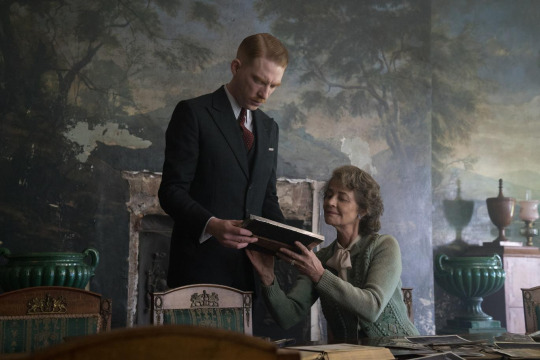
“He’s an utter joy to work with,” gushed JJ Abrams, who directed Gleeson’s first Star Wars, The Force Awakens, and is back for the third in the trilogy. “I love him,” said Jolie, who cast him for the Second World War survivalist epic Unbroken.
I tell him the clippings just portray him as someone who is nice. He smiles, of course. “Having an edge is not something I aspire to,” he says, unflustered. “But I’ve done roles that definitely explored parts of myself that are more than just being a nice fella. I’d rather do it that way, via work, than go out and slate people.”
So he doesn’t want to be contentious? “I would care if I hurt someone,” he says. “And I’m aware my opinions change. I don’t see the point. I’ve plenty of negativity in my life. Plenty of negative emotions. But I’d rather just go there in my work.”
I mention that I emailed Waters before meeting him to ask what she thought about his casting as Faraday, given that neither his CV nor his interviews are exactly littered with hints that he could play a frigid weirdo like the doctor she wrote.
“When I heard Domhnall had been cast as Dr Faraday, I thought, ‘OK, that’s interesting,’” Waters wrote. “In the films I’d seen him in, he plays youthful, endearing characters, and the Dr Faraday of the novel is a bit older and not madly likeable.” Gleeson nods as he hears this. At first, he had been sent the script for a different character. “I understood I wasn’t the obvious choice, because I wasn’t the obvious choice to Lenny.”
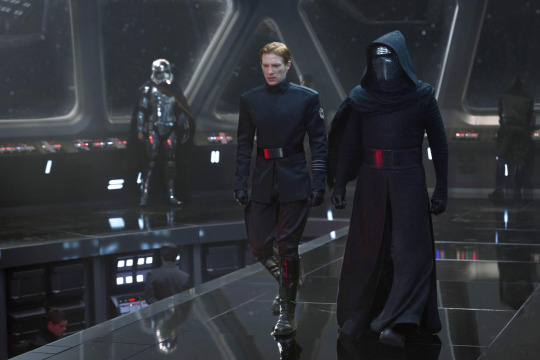
Once you have seen the film, it’s hard to think who else could have done it as well as he does — and his casting is testament to the fact that directors are finding it increasingly hard to imagine a role Gleeson can’t play. (He’d make a great Neil Kinnock.) In American Made, he is cocky and outrageous. In The Little Stranger, he is terrified and quiet. And, yes, it’s acting. Chameleon talent is the entire point. Gleeson is just better at it than most.
Faraday’s a mess, isn’t he? “He’s not well, you know?” Gleeson says with some sympathy. “He suffers from an emptiness that can never be filled, because it’s a desire to be something he cannot be, which is of a different class. There’s just so much bitterness, and lust and anger against women. All those things add up to a man unable to connect. Lenny said, ‘If you carry something explosive, you walk carefully.’ And I think Faraday has this. Part of him understands that he has this facility for violence, maybe.”
He is, I offer, a bit “incel”. Gleeson looks blank, so I fill him in. It stands for “involuntary celibate” and is the creation of a group that came to light in April in Toronto, when a man drove his car into women because he believed they owed him sex. “That’s interesting,” Gleeson says carefully. “It’s what a lot of film noir is about, wondering where a man’s place is. With Faraday, it’s more complicated, and the power thing is different, as Caroline is a woman, but she’s from a class he aspires to. I think he’s lonely. I loved him. I connected to him while we were doing it.”
Gleeson was born in 1983 and started acting in his late teens. He still lives in Dublin, like his family. His dad’s mainstream fame came late, so it wasn’t an acting family as such. He is hardly Scott Eastwood to Clint, so he had to earn his success. He was helped by the playwright Martin McDonagh, who cast him in The Lieutenant of Inishmore on Broadway at 23: a role that gave the actor a Tony nomination. Yet despite all this, Gleeson remains very, well, normal. His conversation, for instance, is about living in a messy flat, or Deliveroo, or his grandparents’ Catholicism and his fears about his lack of faith. “I don’t believe in anything afterwards,” he says. “Wish I did.”
In the absence of the comfort of religion, Gleeson listens to advice from his grandmother. “She used to say, ‘If you’re going to make some-thing, make something beautiful.’ If you try to put some good out in the world through your actions, that’s how you live on.”
Why then, I wonder, did he make Mother!, the Darren Aronofsky film that includes a dismembered baby? Gleeson played a man who fights his own brother. Did he read the whole script? “I did.” Even the baby bit? “It will be excessive and offensive to some people, but, for me, it’s not,” he says. “I thought it was an angry film about something that deserved to be angry about.” He has seen the film twice.

From one controversy to another, we move on to Star Wars — the 50 Shades to the Marquis de Sade of Mother!. The reboot orchestrated by Abrams has had its fair share of detractors, with keyboard warriors furious that the galaxy far, far away isn’t entirely run by middle-aged white men.
Is Gleeson aware of the controversy? “Look, that f******...” he begins, before calming himself a bit. “Having a problem with a female lead or a diverse cast? That doesn’t even cross my mind as being an issue, because if that’s a problem for you, then your opinion doesn’t matter to me. If you’ve paid the money, you’ve bought the right to an opinion. But, also, movies have to change.”
Has there been any attempt on the third Star Wars film to appease the issues a certain section of the fan base had? “Well, this is where my eagerness not to cause waves probably perks up, but I’ve not been aware of any corrective measures. It just feels like the third part of a trilogy.”
The first time Gleeson felt that he belonged as an actor was during his time on Anna Karenina, Joe Wright’s 2012 theatrical film version of the Tolstoy novel. Before that, during auditions or on film sets, he had felt out of place, but Wright wanted his cast to get to know each other, so planned umpteen rehearsals and bonding sessions. “Tom Stoppard was doing yoga with us. It was mad.”
Surely, though, thanks to Star Wars and working with Cruise, he is up there now? He pauses. “There is still something to be got over, and it’s less to do with the fact they’re stars. The power differential is not based on position in the industry, but hours of me watching them, as opposed to them possibly not having seen me in anything.”
That awe happened when he met Leonardo DiCaprio on The Revenant. Surely it’s happened to others meeting him, too? “A couple of people,” he says. What did they say? “They said very nice things.”
32 notes
·
View notes
Text
This Week in Israel
There are two ways to approach this week’s decision by the Supreme Court of Israel regarding conversions to Judaism undertaken by non-Orthodox Jewish groups: as a big deal and as not such a big deal.
The not-such-a-big-deal approach would have to be rooted in a narrow appraisal of what actually happened: the court voted that, with regard to their right to Israeli citizenship under the Law of Return, the Ministry of the Interior does not have the right to distinguish between individuals who convert to Judaism based on the specific rabbinic group that oversaw their conversion…and that this obligation not to discriminate between converts applies even if the conversion in question took place in Israel itself. That last sentence will require some unpacking for at least some, but the underlying idea is simple enough: the Ministry had been obliged by law for decades to respect the conversions of converts from all denominational streams within Judaism if those conversions took place outside Israel. Weirdly, though, this entirely reasonable policy was denied people who convert to Judaism in Israel itself, where the right of the ultra-Orthodox to control those instruments of government that determine matters of personal status—marriage, divorce, Jewishness, etc.—has practically gone without saying since the state was founded seventy-three years ago. On top of that (in the weirdness scale, at least) is the fact that we are, at the end of the day, speaking about only very few people: there aren’t that many non-Jews in Israel who are interested in conversion and the Masorti movement, as the Conservative movement is called in Israel, and the Reform movement together only convert between thirty and forty individuals in a given calendar year. So it’s not like the decision is going to affect a lot of people or alter the fabric of Israeli society in any meaningful way. Why then, the naïve outside observer might wonder, is everybody reacting so strongly to this week’s decision?
It’s a good question. For one thing, the matter has been simmering on the back-burner for a long time. (Click here, e.g., to read a New York Times article from 2005 about the original court case relating to conversions outside of Israel.) But it’s also true that civil rights issues—both as played out in the court of public opinion and as tried in real court—are often so narrow in scope as to sound petty or even unimportant…other than to those who realize the potential implications and ramifications of the decision the public or the court is being challenged to reach. (To cite an American example, it would be missing the point almost entirely to think that all that legal wrangling in the 1960s about desegregating lunch counters or public buses was about luncheonettes and buses, as opposed to being about the larger issues they represented with respect to the civil rights of Black Americans.) And that is, I think, what we have here: a Supreme Court decision that will affect fewer than four dozen people in the course of an average year, but which has ramifications for Israeli society that will extend far beyond the narrow scope of decision itself.
As though they were actors stepping out from the wings to recite the speeches an unseen playwright put in their mouths, the various spokespeople for the various segments of the Israeli population duly appeared in one media-context or another to deliver their pre-assigned soliloquies. The Israeli Chief Rabbinate, a group wholly under the sway of the ultra-Orthodox, was almost sputteringly speechless in its dismay, predicting the imminent collapse of Israeli society if even one single convert to Judaism who hadn’t committed fully to a hareidi lifestyle were ever to be permitted to slip past the gatekeepers. For their part, of course, the spokespeople for Masorti and Reform Judaism were on-line instantly to express their delight. And the largest secular civil rights organizations also spoke uniformly approvingly of the decision. I even noted some actual converts to Judaism putting their two p’rutot in and expressing their gratitude to the court for its decision enabling them to live as they choose in a free country that, at least in theory, has always guaranteed the equality of its citizens before the law.
As is always the case, however, there are several elephants in the room.
The first is that the Supreme Court decision affects the Ministry of the Interior only and requires that it, as a branch of the government, not distinguish arbitrarily between individuals based on data deemed by the court to be extraneous to the adjudication of their situations. What that means practically is that the Supreme Court decision does not oblige the Rabbinate itself to consider converts outside of Orthodoxy as valid Jewish people—and in a county where there is no such thing as civil marriage and Jews can only marry with the approval of the Rabbinate, that matters a lot. (There isn’t even civil burial in Israel: the cemeteries and the Burial Societies that serve them are too in the hands of the Rabbinate.) So these handful of converts, whose status with respect to matters handled by the Ministry of the Interior has now been settled, still have a Sisyphean task before them if they wish to do any of the various things most Israelis take for granted, among them getting married and having the government recognize the union, getting divorced and being enabled to re-marry, dying and being buried in a Jewish cemetery. So it wouldn’t be that wrong to say that this week’s decision creates, rather than heals, an important schism in Israeli society by creating a class of civil Jews who have the formal status, but only very few of the basic rights, Jews born to the faith take for granted. So that’s one of the elephants in the room, known to all but mentioned, as far as I could see, by almost none in the wake of this week’s decision.
And then there are the Russians. This is huge. Over a million Jews from the former Soviet Union have immigrated to Israel since 1989 and today those immigrants and their descendants constitute more than 15% of Israel’s population. The detail that distinguishes the Russians and other FSU types from other large immigrant groups in Israeli society like Jews from Iraq or Yemen is that something like a full quarter are not considered Jewish by the Chief Rabbinate. There are a lot of reasons for that, mostly related to the fact that Jewish life was suppressed for so long under the Communism that there were relatively few Jewish families that remained fully intact and intermarriage with non-Jews was rife for decades. Layered over that fact is the reality that many of these people—most of them, in fact—have been living in Israel for decades now, speak fluent Hebrew, have served in the IDF, and think of themselves as “real” Israelis. Except that the Chief Rabbinate refuses them the right to marry, to be buried in Jewish cemeteries, etc. No one seems sure how to fix the problem either—nor does this week’s Supreme Court decision go very far towards finding a solution since it only affects the policies of the Interior Ministry and the immigrants from the FSU are all citizens anyway.
The closest parallel for Americans to consider is the one between these immigrants from the FSU and the undocumented immigrants in our own country. Everybody agrees that having 11 million undocumented souls living in our midst but not paying taxes, not paying into the Social Security system, not feeling free to phone 911 if they are in danger, not participating in national or local elections—the one thing upon which everybody seems to agree is that the status quo is intolerable and has to be addressed. But how exactly to address it is a different question entirely. The notion of rounding up all 11 million people living illegally in this country and deporting them to wherever it is they came from in the first place is an idea that appeals to many in theory, but lacks any real practical possibility of ever happening. The ideas put forward by the current administration, and particularly by Alejandro Mayorkas, Secretary of the Department of Homeland Security, seem to presuppose that the only real solution is to find a path for these people to seek citizenship that would involve some level of catch-up (for example, paying taxes on money earned in the U.S. during their time here but on which they never paid income tax) and would exclude criminals. Eventually, we have to deal—one way or the other—with these millions and millions of people!
And the parallel is almost exact: Israel cannot simply look away and ignore the fact that 15% of its Jewish population simply isn’t Jewish enough for the Chief Rabbinate. (That they are considered more than Jewish enough to serve in the IDF only adds fuel to the fire.) And the only practical solution has to do with conversion: since these people were already not born Jewish, at least not technically, a procedure has to be evolved for them formally to embrace Judaism and solve the problem that way. Since such a solution would almost definitely have to involve the more liberal denominations whose understanding of religion in general and Judaism in particular are more sophisticated, more scholarly, and more intellectually and historically justifiable than the extremist Orthodoxy of the Chief Rabbinate, the Supreme Court decision this week speaks indirectly to that whole set of issues by bestowing the mantle of legitimacy—if not in the eyes of the Rabbinate, then at least in the eyes of the State—on people who convert through movements more given over to the principles of tolerance, non-judgmentalism, pluralism, and intellectual integrity.
So those are the two elephants hiding in full sight for most Israelis. And that is why this week’s Supreme Court decision not only matters, but has the potential to be truly transformative in the effort to create a kind of Israeli Judaism that rejects the kind of know-nothing fundamentalism that is the hallmark of the kind of Judaism represented by the Chief Rabbinate and in its place embraces a version of Judaism rooted in acceptance, fairness, tolerance, and spiritual integrity.
1 note
·
View note
Text
I Hate Award Shows: Or “How I Learned To Stop Worrying And Love The Dana”
Even the thought that I would be hosting an award show was totally laughable. Until Dana convinced me. #younghowzetheatreawards
By Ricky and Dana Young-Howze
Mays Landing, NJ
Venmo: @rndyounghowze
My name is Ricky Young-Howze and I hate award shows. In fact I will go out on a limb and say I hate awards. Now I’m immediately going to qualify this statement. From my first start of theatre training in High School all the way through Grad School there were few awards in my area. No one in my theatre community won them and no one seemed to care. So my professional aspirations never included winning awards.

In over a decade of theatre training I’ve applied to one competition twice (SETC’s Getchell for playwriting) and won one separate award (my undergrad’s award for Exiting Senior). With the Getchell it was because I had, had a successful reading of a play and knew I was probably stupid if I didn’t enter while I was still eligible. As for the second I knew that the award was given out but I would have never thought in million years that I was going to get it.
That started a pattern that I’ve kinda stuck with. If an award landed in my lap then I would be ecstatic but I don’t really see putting in all the effort to get one. If one of my shows had a decent run and I made some decent money (I’m talking $500 bucks or so) then I would be happy. Those are my aspirations.

Then there are my opinions themselves. I don’t watch, follow, or even care about any major award show. The last time I really cared about an award winner was either Black Panther or Pentatonix because I’m huge fans of theirs. I don't even like Broadway or the Tony awards and I can’t name a single Tony Award winner from the last two years. I believe awards invite toxic thinking. If you have an award winning show you have no incentive to try out a new team. You keep that team and keep doing what you’re doing to replicate that success. Yeah some people are going to say that they award innovation but those innovations don’t seem to really be there to make the lives of every artist better. They’re just there to win the award. Also any person who hasn’t been living under a rock knows that these award shows are rigged against Black and LGBTQ+ artists. They have to win by a mile to even be nominated. There’s something seriously wrong here.
Dana knows I feel this way and, for the most part, agrees with me. That was why before the pandemic we were planning to do a hokey Weird Al style award show that parodied everything we hated about award shows. An award show where the categories are made up and the awards dong matter.

Then a pandemic happened and we got thrust into the forefront of a new landscape of American Theatre and a worldwide movement to make digital theatre a new genre. We have thrown up our hands in exasperation as colleagues and theatre reviewers are still asking “what is digital theatre?” Like it hasn’t been here for a solid year. I keep on swearing that this isn’t a race but I can’t believe we are winning it.
That was when Dana started talking about this award show like it was going to be a real thing. Like a really legitimate thing. I think the first thing I said was “why? Award shows suck.” They said that they knew and didn’t care. Dana wanted artists to know that the work that they were doing last year was seen and someone valued them. I was slightly intrigued with the idea that everyone who made art last year did it without thinking about what awards they would win. There were some powerful plays done mainly because the artist involved had nothing left to lose. I really did admire that. So I thought that we should do “something”. I just didn’t know what.
I think the second thing I offered was some weird scheme where everyone would send in a self-taped speech and it would be pre recorded. Dana really didn’t like that option. They said that they wanted it to be live. I asked them if they were crazy (I’m just perfect spouse material aren’t I). Dana was insistent and they were the ones who reached out and built our whole team from the ground up. It was them who got the ball rolling and I felt like I wasn’t helping at all. Dana and I don’t always agree on everything but we have never been so far apart on how to handle something.
Dana and I fought about it for about a month even after we started to get our team together and the date was already set. Then the anxiety started to set in and they finally broke down. They unloaded on me and accused me of dragging my feet and they were correct. Over the next few days about three weeks before we had to announce nominees I had to talk them out of cancelling the whole event. In about the span of a week or so I started to understand what Dana was doing. I was the one dragging my feet and then I had to convince the person who started this not to give up. Why? Well let me tell you the argument I gave to them.
Dana’s award show is different. We are trying to get away from the words “best” and “won” and more of the words “exemplify” and “of the year”. We have started to parse out the best standards of digital theatre and we wanted to identify the shows that best exemplify those standards. This is the first time that we are categorizing and studying this art form. We were hoping that if we put the standards out there that artists would start trying to meet or even exceed them. We were also hoping that if we made a big enough splash maybe the mainstream media would start to cover it as a real thing that is happening. What better way to do that than with an award show?
We’re not trying to ingratiate ourselves to our friends, or talk about what was popular. We’re trying to talk about what was effective and bring the community together. We’re also not saying that we’re always going to get it right. We started with the idea that everyone has already won. Anyone who is making theatre deserves a medal in our book. No one ever asked you to do theatre, especially during a pandemic. We wanted a way to put a big bow on this crap storm of a year and celebrate the hard work of this worldwide community. This award show was just a way of amplifying that work. You guys are the real stars and you guys are what made this show work. Without your great work ours would have fallen on its face.
Check the Show Out For Yourself Here
*****A Word From Our Sponsors*****
https://teespring.com/rnd-younghowze?pid=972
We have official merch now! Keep us fed and get gifts for the family all at the same time!
Wanna be a sponsor? Email us for rates at [email protected]
Check out our Social Media
Twitter: @rndyounghowze
Instagram: @rndyounghowze
Facebook: Ricky and Dana Young-Howze
0 notes
Text
Fate // Jughead Jones
Summary: Returning to the town you fled a decade ago following a career failure you never expected to fall in love with him again. You didn’t want to fall in love after the New York love you believed you had. It seems fate wanted to teach you a lesson again.
Characters: Jughead Jones x Reader, Betty Cooper (mentioned), Veronica Lodge, Archie Andrews (mentioned), and Reggie Mantle (mentioned).
Words: 2263
Disclaimer: I do now own Riverdale or the characters. I do not own any gifs that appear in this either or images because they’re probably off google images. The gif at the end comes from a youtube video of angst ridden Jughead scenes by the account littlesociopath other wise known as @wallflowerproduction
Warnings: Possible swearing, implied mental and emotionally abuse, fluff and angst.
Author: Caitsy.
A/N: I never actually edit my writing and I apologize for that but I’m way too busy to edit. This is also based on the Hallmark series Chesapeake Shores.
Master List
Prompt List
ASK US A QUESTION LIST

You were firstly a playwright that had an astounding first play that had your name in the leagues of famous playwrights. You riding the high with your sold out play until a year later your second play was brought to stage. It came with mixed reviews but your fears of failure were hit when your third play was a massive crash with so much negative criticism that barely any tickets were sold after the opening night.
You retreated back to your hometown of Riverdale feeling pathetic. You hadn’t been back in Riverdale in the ten years since you graduated high school. You left behind everything for the big city. Even the boy was your confidant.
When your parents divorced following your mother leaving your barely there father you changed. First your old sister Anna ran when she graduated five years before you to build a new, albeit parentally parallel version, with two kids and a divorce. On graduation day you had your car packed for the rest of your life.
You promised yourself you wouldn’t come back but here you were standing on your family porch watching the kids play in the street. You had been back for three days to hide out with your little sister.
“He’s back in town.” Bella said tucking her legs under herself.
“Who?”
“Jughead.” Bella simply said, “Look I don’t know what happened in New York but Jughead won’t close the door in your face.”
“You don’t know that.”
“I do.” Bella softly spoke.
“I broke his heart.” You sadly smiled thinking back on the day you told him you weren’t coming back. Just remembering his face split your heart in two, “Besides isn’t he happy with Betty?”
“They barely lasted a month after you left, you would know if you let me tell you that years ago.” Bella sung with a smug smirk.
You were shocked to hear that they had split up. Where you saw Jughead you would see Betty and vice versa. Maybe that’s why leaving was so easy. Knowing was too busy to hang out with you and that distance helped but it still hurt ten years later.
“He thinks I’m a pitiful human.” You grunted tapping your fingers against the chair, “I told him I was going to make it big and never have to come back. Yet here I am.”
“Has Ian called you yet?”
You tensed up remember the man you wasted seven years on both professionally and personally. Ian had been your mentor before it blossomed into a relationship you drowned yourself in. It took a year before your feelings for Jughead faded behind but things didn’t pan out. You caught Ian cheating and realized how toxic he was.
You vividly remember him praising your first play before cutting you down with the way you went about your second play. When you brought up wanting to sent a manuscript out he scoffed and reminded you that you were good but not that good.
“Ian’s part of my New York life. That part is done.” You spat, “I wasted seven years on someone who didn’t appreciate me. God I’m so stupid.”
“Will you tell me what happened?”
“Maybe another day.” You sulked climbing to your feet, “Gram threatened me to get out of the house. She says hiding out with just make the experience worse.”
Your gram was one smart lady and nobody went against her words. That’s why you had your jacket on and phone in your pocket. The first place you would go was Pops for a milkshake that no milkshake in New York could compare to.
“Wants some company?"
“Don’t you have that coffee shop you attend to.” You winked pressing a kiss against your sister’s cheek, “See you at supper.”
You knew people in town had heard of your return so when you walked in your were prepared to see looks from everyone. Didn’t make it any more comfortable as you leaned into the window with a melting milkshake in front of you.
“Hey hun.” The waiter spoke coming closer, “Would you like a new shake?”
“No thanks.” You mumbled.
“I’ll take a strawberry one.”
You tensed up looking to see a matured version of the boy that followed you in your dreams. Still wearing that ridiculously endearing crown was Jughead. He had scruff on his face and a little more definition in his body but it was still lanky sardonic humoured Jughead Jones.
“Jughead.”
“Y/N.”
Each of you playing with your hands as the awkwardness set in. What do you say to the person you were once so close with? Hey seemed so…weak but it’s not like you can launch into your latest horror.
“How’ve you been?” You awkwardly asked. Nostalgia set in as Jughead swiped the cherry on your milkshake, something never change.
“Same old when your best friend comes back after abandoning you.” Jughead shrugged with an edge in his voice. You winced, “Especially when you don’t know they’re coming seeing as they changed their number.”
“I’m sorry.”
“No you’re not.” Jughead retorted leaning back, “But it’s not why I’m sitting with you. I want to know if your staying.”
“So you know where to avoid me?” You glared crossing your arms.
“No. So I can prepare to see you and not let it break me again.” Jughead returned, “Did you know Reggie’s coaching the football team? He lost his football scholarship after a gnarly knee injury his freshmen year.”
“No!” You gasped leaning forward, “What about Ronnie and Archie?”
“Together still.” Jughead rolled his eyes, “Archie told me they were thinking of having kids by next year. Their wedding was beautiful.”
“I couldn’t make it.” You admitted looking down at your hand.
“I know. It was opening week for your second play.” Jughead casually interjected as he ate the cherry from his recently delivered milkshake.
“You knew?” You gasped blinking at him.
“I went to your first play.” Jughead said leaning back, “Was going to say hi but you were busy.”
“Critics wanted-“
“No you were busy with what’s his face’s tongue in your throat.” Jughead sneered, “This was a mistake.”
Without a word you watched Jughead abandon his milkshake for the door and you made your second mistake. Not going after him.
You ran in Jughead multiple times the next week before he mysteriously disappeared for a month. You kept busy by staring at the second hand typewriter your father gifted you or helping Bella with her coffee shop. You had coffee with Veronica a few times also.
“You look gorgeous!” Ronnie exclaimed, “How are you not married!”
“Guess there hasn’t been time.”
“Or a certain raven haired man wasn’t in your life.” Ronnie sang sitting down into the chair. She was glowing still in that newlywed stage of her marriage.
“You look happy. I’m sorry I couldn’t be at your wedding.” You smiled at your old friend.
“I am.” Ronnie blushed looking down, “It’s okay you didn’t make it. You weren’t ready to see Jughead.”
“It’s stupid that I didn’t go to your wedding because I didn’t want to see how Jughead and Betty were.”
“They were over by then.” Ronnie said waving her hand.
“Bella mentioned that.” You whispered looking down, “What happened?”
“I think you leaving opened Jughead’s eyes to his feelings for you. Betty couldn’t deal with it and they broke up a month after you fled Riverdale. For little bit she..uh…went all dark no stars Betty again. Went to Stanford, met some guy and now has two kids in Boston.”
“Whoa.” You breathed, “I always thought they would get married.”
“Hm. Archie and I didn’t think so. I was always rooting for you and Jughead.” Ronnie shrugged taking a sip from her drink.
“Where is he?”
“Small book signing in Chicago and New York.”
You embarrassingly had each book that Jughead had gotten published in the years you hadn’t been in his life. There was one you wouldn’t touch though. It was something you would have never pegged Jughead to write about. It was a love story and you knew it was about Betty and it hurt too much to read that.
“Oh.” You mumbled.
“Gosh look at the time.” Ronnie said catching the eyes of someone coming in the door, “I totally forgot Archie and I have dinner plans.”
In a tornado of sophistication Ronnie strode out of the coffee shop your objections falling on deaf ears. It was barely half past one.
“You’re here.” Jughead sighed sitting down in the newly vacant seat.
“This was staged?!”
“Ronnie believes Archie and her planned me into coming here unbeknownst your were here too.” Jughead informed you, “They’re too predictable.”
“I thought you were ignoring me.”
“Once again. I don’t have your new number and by the time I wanted to find you I was being herded to Chicago.” Jughead retorted, “In fact when I broke up with Betty I drove all the way to New York to tell you I loved you but I saw something between you and that Ian guy.”
“You wanted to see me again after I broke your heart.” You marvelled as he blushed a very faint pink as he brushed it off with a scoff.
“Of course I did. I want to know everything about you Y/N.” He chortled goodheartedly, “So tell me everything since you’ve left Riverdale.”
And so you did.
You told him about how you struggled the first few years in New York to get your work onto stage while waitressing when you could. You told him how you met Ian and you were blind to what Ian was doing. You told him how you felt with your plays and how you had wanted to be published but Ian broke you down.
And he listened and maybe that was his second mistake.
In a span of two hours you relearnt everything about each other with that same spark reigniting between you two. Soon coffee turned into lunch dates and lunch dates turned into movie and takeout. It led to staying over and I love you’s. It also led to a regret you knew you would have for the rest of your life.
Six months following your relocation to Riverdale things got complicated. Your mother moved back along with your two other siblings. Anna brought your nephews after their father lost his rights to them. Dylan, like you, retreated after an epiphany got him thinking why he was in a job he hated.
It took time before your family healed and Jughead stood by your side as it happened with resolve to never leave. That’s why when a thick envelope came in the mail with your name you were both confused and elated.
A big publishing head in New York had resent your half finished manuscript back with good reviews and you were getting published.
“Who did this?” You spoke amid the celebratory hugs from your sisters and mother.
“You didn’t send it?” Anna asked equally confused. It seemed the only one that had an inkling was in fact your mother.
“Who knows you were writing-“
“Jughead.” Your voice broke as you said his name.
They awed over the fact that he believed so strongly he sent your manuscript in but you didn’t feel that same emotion.
Smiling at the Riverdale folks strolling past you finished placing the books into the piles on the tables outside before sighing. You had reopened the bookstore in the middle of town to bring imagination back into the same town. It was something you had loved growing up and wanted to give young children the same experience.
“Hey babe.” Jughead said pressing a kiss to your cheek. He had been in Toledo visiting his little sister Jellybean for the last week.
“Hey Jughead.” You murmured stepping away from him.
“What’s wrong?” He questioned looking to see you were looking anywhere but him.
“Did you send my manuscript in?”
“They want to publish it?” Jughead grinned placing his hands on your shoulders to combat his excitement.
“They do.” You sighed looking up at him with such heartbreak he was confused, “I don’t appreciate that you did that with out my approval.”
Jughead was now beyond confused because he thought you would be happy knowing that you were getting published. Something he knew that you didn’t believe you could do on your own.
“It’s just a manuscript.”
“You don’t understand. You didn’t let me decide about it Jughead. You took that right from me and that’s not okay. I spent seven years in New York living with that and when I got back to Riverdale I promised myself I would never let that happen.”
“I’m nothing like Ian, Y/N!” Jughead exclaimed shocked.
“I know but what you did is exactly what Ian did to me. He changed my plays by convincing me they needed to change. I didn’t get to decide what happened in my plays and it affected my career.”
“I’m sorry.”
“I am too.” You cried, “I’m sorry Jughead and I’m going to regret this the rest of my life but I can’t let the time I’ve spent refinding myself and leaving New York be wasted.”
It seemed like earth was just as upset about the break up as both Jughead and you were because it began to pour down. Raising a hand to Jughead’s cheek you pressed a kiss to his lips before heading inside your bookstore already regretting that you had done.

(gif from @wallflowerproduction on youtube via their account littlesociopath
But in the end placing yourself first after those years with Ian was needed.
Forever Tag List
@cityofsobbingfangirls @tas898 @barbidollash @trustnobodyshootfirst @winchesterfanfiction @deanwinchesterisamazing @oh-my-hecky-padalecki @padackles2010 @msimpala67 @deangirl5509 @heyitssilverwolf @therealme13posts @petlaufeyson @professionally-crazed @winterhurricane @tearsandbloodofmyenemies @blackwidow-romanoff @crazybarnes @marvelofcourse @takemetothefictionalworld @destiel67bellarke @ohmy-sammy @fightinthepain @vivabucky @waituntilthedustsettles @daydreaming1393 @cumonbucky @inhumans-of-shield @basicwhiskeyprincesss @soulfull-ofevans @spookass @glitterintheairblog @girl-with-wild-dreams @frickin-bats @darkestgrungeuniverse @shamvictoria11 @buckyappreciationsociety @sammysgirl1997 @fly-f0rever @archer-whovian-violinist @jenn0755 @anamarieswift2194 @unicornofdanger @ifyoudie @jealousbitxh @stormin-thru-glitter @sparklyaura @stilescstilinski @curlyxtomato @katshrev @its-sanaa-k @theoismydad @im-a-light-child @tmriddler @flirtswithdanger @divide-supermarketflowers @arkhamasylumpatient-blog1 @introverted-fandom-human @jennylj16 @potterandbucky @harleenq4life @runs-with-sciss0rs @superhero-lover101 @ridingmoxley
Riverdale Taglist
@n0average @ateliefloresdaprimavera @sgarrett49 @jarchiee @casismyguardianangel @supernovares @juggie-sprouse @an-enigmatic-avenger @leah-khaleesi @rax-writes @shameless-danni @rapunzxl @peetapansneverland @peetapansneverland @sebby-staan @katshrev @zachmantle @30inlovewiththecoco1 @semoremohhh @gilly-grantgustin-the-flash-glee @roses-are-bae @jackyfrost01 @cheytheredhead @my-baby-daryldixon @ladyfairenvale
#jughead jones#riverdale imagines#jughead jones imagines#cole sprouse imagines#cole sprouse#veronica lodge#betty cooper#archie andrews#camila mendes#lili reinhart#kj apa#chesapeake shores crossover idea#agentsofsupernaturalmarvel#fluff#angst#adult!jughead jones x reader#jughead jones x reader
130 notes
·
View notes
Text
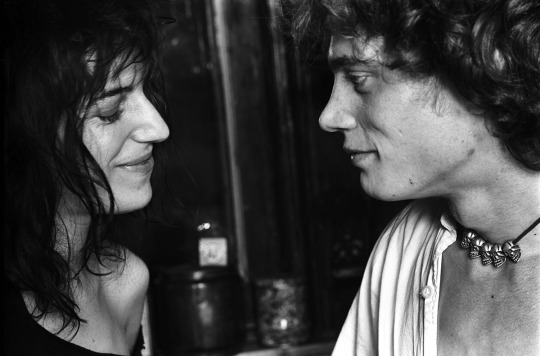
Patti Smith’s Just Kids captures the epicenter of art and grime that was New York in the 1970s. She centers the story upon the unorthodox girl she was in her twenties, and her predestined relationship with the late photographer Robert Mapplethorpe. The story Smith unfolds is a mesmerizing cluster of moments, each as brilliantly imaged as her cherished blue star. While her autobiographical account is rooted in the happenings of her intimate routine, the novel is read as a field guide to her version of the vast city. Yet, Smith disregards the objective city by blending the real and the otherworldly in her seamless streams of consciousness. The constant that threads together the contradiction of her city life is her love for Robert. Their relationship is celestial; they are two soulmates brought together almost divinely, and yet their closeness is physically distant and intertwined with the figures around them. Intimacy and multiplicity are figuratively mutually exclusive yet in practice interdependent in Smith’s depiction of New York.
The structure of Just Kids is artefactual, organized by a series of moments through which the reader is guided like an observer in a museum. Smith is a skillful curator, constructing her personal enclave within the larger city. One of these moments is Christmas at her and Robert’s first apartment:
“He liked the boxes of Joseph and often transformed significant bits of jetsam, colored string, paper lace, discarded rosaries, scrap, and pearls into a visual poem. He would stay awake late into the night, sewing, cutting, gluing, and then adding touches of gouache. When I awoke there would be a finished box for me, like a valentine. Robert made a wooden manger for the little lamb. He painted it white with a bleeding heart and we added sacred numbers entwining like vines. Spiritually beautiful, it served as our Christmas tree. We placed our gifts for one another around it.” (Smith 51-52) Smith illustrates moments palpably to craft their intimate world. She and Robert physicalize their isolation from the outside; the act of making their own original talismans mimics creating a new reality. Smith’s description of Robert fashioning the manger is almost ironic: it depicts him in reference to the stereotype of handy man of the house, constructing practical objects for his family. Their concept of practical or necessary, however, is unusual. Smith cherishes the manger painted with a “bleeding heart” and “sacred numbers”, despite having little functional furniture in their apartment. (51-52) The manger serving as a Christmas tree also holds meaning. The two Catholics are at once rejecting the tradition of the classic decorated tree and celebrating their own eccentric version of the popular holiday. Thus, Smith’s capture of this creative moment is both decidedly intimate yet still connected to the multiplicity of daily life.
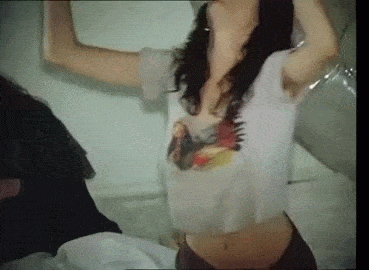
These snapshots of creation may appear to some readers to trivialize her journey of self-discovery or render it superficial, but they do not. In broad terms, the moments she writes are the intricate pieces of the mosaic that is her perception of New York: each piece is different, entirely sustainable as a world of its own, yet fits perfectly within the grand scheme. Hence, Smith’s structure enables the formation of her intimate world but grounds it in the colorful context of the city, successfully interconnecting intimacy and multiplicity.
Furthermore, Smith’s novel entertains a duality between the real and the unreal. Her dichotomized place in New York is introduced in early stages of Smith and Robert’s relationship, as Smith describes:
“One Indian summer day we dressed in our favorite things (…) we took the subway to West Fourth Street and spent the afternoon in Washington Square. We shared coffee from a thermos, watching the stream of tourists, stoners, and folksingers. Agitated revolutionaries distributed anti-war leaflets. Chess players drew a crowd of their own. Everyone coexisted within the continuous drone of verbal diatribes, bongos, and barking dogs.” (Smith 47)
This scene offers an image rife with energy and movement in the public environment. Yet, while Smith speaks of coexistence, she refrains from placing herself into the context she defines. She serves only as the observer, sipping coffee with Mapplethorpe gazing onto the outside from within their transcendent experience, displaying an otherwise dynamic sequence as coldly as a still-life. It is only when an older couple comments on her and Robert’s roles that Smith closes their distance from their surroundings. The woman tells the accompanying man to take a picture of the two characters that seem like artists to her. “’Oh, go on,” he shrugged. They’re just kids.” (Smith 44) Significant enough to inspire the title, this encounter introduces the ideas of intimacy and multiplicity within Smith’s world and the city around her. As much as she and Robert seek to elevate and enchant their realities, they have become stereotypical, two of many inhabiting the city. They may present themselves as the personas associated with their alternative lifestyle, but ultimately Smith recognizes their commonality. In this way, she calls the distinction between intimacy and multiplicity into question, refusing to abandon one to obtain the other.
The line between real and unreal is rendered particularly nebulous in the context of the Chelsea Hotel.

“In between I clock the action. Eyeing the traffic circulating the lobby hung with bad art. Big invasive stuff unloaded on Stanley Bard in exchange for rent. The hotel is an energetic, desperate haven for scores of gifted hustling children from every rung of the ladder. Guitar bums and stoned-out beauties in Victorian dresses. Junkie poets, playwrights, broke-down filmmakers, and French actors. Everybody passing through here is somebody, if nobody in the outside world.” (Smith 91)
The graphic use of italics here visually signals a shift in Smith’s narrative. It underlines the dreamlike sequence that is Smith and Mapplethorpe’s experience at the Chelsea Hotel, distancing the people and happenings in the hotel from the urban exterior. The mention of “stoned out beauties in Victorian dresses” widens this distance by adding an epochal dimension to the hotel’s otherworldliness. (Smith 91) Lastly, the last sentence draws a boldly strict line between the hotel and the “outside world”. (Smith 91) Yet, the ideas of being “somebody” at the Chelsea and “nobody” in the vaster realm of Manhattan are inextricably linked. (Smith 91) Within the environment of the Chelsea, Smith belonged to a circle of drug-infused artists and patrons: society’s misfits bound together through shared estrangement. They had become somebodies amongst themselves evidently because they had all experienced the isolation of having been nobodies. Therefore, Smith underlines a causal relationship between the intimacy of the Chelsea Hotel and the inhabitants’ incongruence with New York city’s multiplicity.
Smith’s definition of intimacy is explored in distinct instances of Just Kids. It is a central theme to Smith and Mapplethorpe’s epic love story. It appears that their relationship guides the plot’s development, and hence mirrors Smith’s grander depiction of the city in terms of intimacy. From the moment they meet, Smith and Mapplethorpe are drawn to each other. Their initial encounters recall fairytale lovers who credit fate for their meeting. Disregarding courtship, they readily accept each other into their lives, as Smith states not long after their first meeting, “(...) I understood that in this small space of time we had mutually surrendered our loneliness and replaced it with trust”. (Smith 40) From this moment, much of Smith’s writing about their relationship is description of their routine. Painting and creating side by side was their ritual; in this way their daily lives were engulfed in the other’s. Despite this, Smith consciously refrains from including information that would define their relationship. While they were in love or perhaps they cared profoundly for the other, the lack of romantic intimacy conveyed alluded to the idea that their relationship was platonic. Smith’s ambiguous account of her and Robert’s bond calls intimacy into question, and perhaps deliberately pushes against its singular definition.
Multiplicity also plays a part in building Smith and Mapplethorpe’s intricate relationship. The number and diversity of figures they encounter allows them to create their intimate world away from reality. At the Hotel Chelsea, they meet an array of people including Mr. Bard, Harry Smith, Peggy Biderman, Ann Powell, Bruce Rudow, Sandy Daley, and Matthew Reich. Each person elicited a form of self-discovery for both Smith and Mapplethorpe. The introduction of these figures play an integral role in both of their artistic pursuits, and therefore reinforce their mutual creative inspiration for one and other. Thus, their intimacy is invigorated by the multiplicity of creative characters around them.
However, Smith and Mapplethorpe’s world undergoes growing tension throughout the novel. One instance in the novel that represents a striking turning point in their relationship occurs when Robert goes to an abandoned hospital and finds a fetus preserved in jar. Convinced he should transform the fetus into art, he steals the jar, but on their way home he inadvertently drops it. Smith describes the effect of this accident with the following citation:
“The purloined jar had sat on a shelf for decades, undisturbed. It was almost as if he had taken its life. 'Go upstairs,' he said. 'I'll clean it up.' We never mentioned it again. There was something about that jar. The shards of heavy glass seemed to foreshadow the deepening of our days; we didn’t speak of it but each of us seemed inflicted with a vague internal restlessness.” (Smith 69)
The jar appears to be a symbol that represents a tonal shift in Smith’s description of their relationship. Though Robert did not actually take the fetus’s life, Smith mentioning this represents birth and death simultaneously. The incident undoubtedly brought her own abortion and the trauma associated with it to mind. It could also be said that the scene underlines the limitations of Smith and Mapplethorpe’s nontraditional intimacy in terms of family-making. In this sense, the jar evokes the multiplicity within the intimacy, or the complexity that is the essence of Smith and Mapplethorpe’s feelings for each other, and for their perceptions of themselves. In fact, it is the very multiplicity within their relationship that eventually redraws its own confines. Thus, the “internal restlessness” Smith refers to foreshadows the increased strain on their world and the unease that accompanies these complexities. (69)
The themes of intimacy and multiplicity can be perceived to define not only the relationship between the two central characters of Just Kids, but also urban life itself. Manhattan is the singular backdrop for this story. This island, surrounded by water yet the heart of the world, is the essence of intimacy within multiplicity, of a patchwork of surface, sound, sight, scent, and taste. At any moment, this kaleidoscope of experience can collapse or delicately fold into the intimacy of a bedroom, a café table, a hospital bed. The structure of the book, the otherworldliness Smith references, and Robert and Patti’s complex relationship strengthen these interconnections between intimacy and multiplicity that are central to her New York story.
2 notes
·
View notes
Text
Lois Smith’s Life Unfolds On Stage And Screen. In 2017, It’s All Paying Off.
New Post has been published on https://usnewsaggregator.com/arts-culture/lois-smiths-life-unfolds-on-stage-and-screen-in-2017-its-all-paying-off/
Lois Smith’s Life Unfolds On Stage And Screen. In 2017, It’s All Paying Off.
To talk to Lois Smith is to hear her professes, again and again, how “fortunate” and “lucky” she has been, almost as if everything in her career happened by chance.
At 87, Smith is closing the book on what may be the splashiest year of her seven-decade tenure in film and theater. In January, the big-screen adaptation of “Marjorie Prime” premiered at Sundance; Smith’s performance has since sparked Oscar buzz, collecting nominations from the Gotham Awards and the Independent Spirit Awards. Smith originated the role onstage, in Jordan Harrison’s Pulitzer-nominated play about an octogenarian conjuring memories from her life in the company of her late husband, who assumes the form of a computer-programmed hologram.
The movie “Marjorie Prime” opened in August. Then, Smith appeared in November’s “Lady Bird,” the acclaimed Greta Gerwig film that’s another awards season favorite. For a venerated actress who has consistently worked without achieving widespread fame, Smith’s 2017 has been an improbable treat. It’s one of precious few examples of aging performers earning their due.
HuffPost sat down with Smith in New York on the afternoon of last month’s Gotham Awards. If she earns an Oscar nomination on Jan. 23, she’ll be among the oldest nominees in the award’s 90-year history. What does she think of all this fuss? She’s grateful, of course, but she could do without it, too.
It seems you’ve had a huge year. Does it feel that way to you?
Oh my gosh, it’s been wild. This past year has been very quiet for me, actually, in a certain way. I was recovering from [her partner, actor David Margulies’] death, which happened a year ago last January. It’s getting into almost two years now.
But the year just before this very year was so busy. The first time I did “Marjorie Prime” was the fall of 2014, and after that, I did a play at [Steppenwolf Theatre in Chicago] that Rory Kinnear had written, his first play, and directly back to New York and pretty straight into Annie Baker’s play “John” [at Signature Theatre Company in August 2015]. And right after that was the filming of “Marjorie Prime,” and right after that — I mean, really, hours — into the first rehearsal of “Marjorie Prime” onstage at Playwrights Horizons.
And then it was January of 2016. That year, I turned down all the roles that came for the stage. Nothing I was really into. But I started doing quite a lot of guest shots in episodic series. It’s all been really overwhelming, really it has been.
I’m not working [now]. Well, I’m doing television stuck in among the other things, briefly. I’ve got plays coming up, but not until spring.
Do you prefer to stay in New York?
I do. I love to be at home. I really do.
Was there a point in your career when you became choosier about the roles that required travel?
Well, for quite a while I was a single mother with a growing child, and I thought, I can’t really take long trips, and I also don’t want to. It’s a good excuse.
And then later, there were good times, onstage and on film, of going out of town. I haven’t done a lot of classics, though. I’ve done almost no Shakespeare, I’m sorry to say, but I did get to do some Chekhov and Shaw. Irene Lewis was so great — the first time I worked at the Baltimore Center Stage, when she was the artistic director, I did a modern George Walker play, and she asked me if there’s anything I wanted to do. At that time, I knew I wanted to do “The Cherry Orchard,” and we did a beautiful production. And then I said, “When I was a student, I always thought I’d do Shaw, and I never had.” And she did “Mrs. Warren’s Profession” for me, so that was a treat.
I always say it’s the people or the material, and when the people and the material were very attractive, there’s no reason I couldn’t do the plays.
Is there a Shakespeare role that you’d love to get your hands on?
You know, it’s a little late now for my favorites. There might still be something.
You could kick “Macbeth” up a couple of generations and do an older Lady Macbeth, right?
[Laughs.] We’ll see.
The list of people you’ve worked with is astonishing: John Cassavetes, James Stewart, Helen Hayes, James Dean, Jack Nicholson — all before 1980.
Isn’t that amazing? As it happens, it just happens. You know, James Dean was not an icon. He was a very talented, fascinating young actor doing his first movie. Certainly, some of it has been sort of astonishing, but it’s never like ― gasp!
I’ve been most greatly fortunate, and sometimes very fortunate to have something drop in my lap, like working with James Stewart on a television show. That was just a funny thing — I don’t know how it happened. Somebody in the big television casting stuff must have noticed that I was one of the young actresses who had started to work. But it was never a big pursuit. I just kept working. I’ve been very fortunate to do that.
Did James Stewart have a big movie-star aura?
No, no. Most people are lovely, really.
“Marjorie Prime” has consumed such a large portion of your life.
It’s been well over four years since I was first handed “Marjorie Prime” to play. I’ve been living with it a long time.
It does seem like your profile has risen in conjunction with this role. Audiences get to discover the same role across stage and screen.
It’s interesting. When you just said stage and screen are coming together, that’s true, really, because I don’t think that’s ever happened before for me, and it doesn’t happen very often that people play something on the stage and get to make a film of it.
Now, when I did it onstage, I did it at the Taper in LA, and at the Playwrights Horizon. These are places where I’ve done regional theater, and the New York scene of theater companies where I have worked for a long time. So that was not a new audience for me. It was wonderful to bring this wonderful play to these audiences, I certainly feel that. And in film, again, I’ve been doing films for 60 years, but this one was really special. It’s special on its own terms.
Some critics have called it the greatest role of your career.
I don’t even know how to think about that. Whenever people ask you something like that, you know — the answer to the what’s-your-favorite question is, “The last one.” Because what are you going to do? It’s very hard. There are many meaningful things for different reasons, and especially once you’ve been at it as long as I have.
What were your first ideas about the play, which addresses concepts of memory and death?
The minute I read it, I was so excited. […] I’ve always found [Marjorie Prime] the most full-of-life character. The play is funnier, and the movie is sadder. It has partly to do with the adaptation and partly to do with the tonality of the two different people who made them. It’s the same story, but of course, there are differences with the movie. The play takes place in one room, and I was mostly sitting in a reclining chair all evening. That’s a big difference, but the character remains very much the same.
When you first saw the movie, were you prepared for that tonal difference?
It took me quite a while to accept the movie entirely as itself because I couldn’t help it. I’d been living with this text for a long time. I’d read the screenplay [by Michael Almereyda], and of course, admired it from the beginning. And I think I increasingly appreciate many things about it.
I think Michael did many wonderful things to make this a movie, because it’s not a simple, obvious thing to do when it’s very contained, with few characters in one place. It’s very verbal, and it’s very thoughtful and provocative — all things I love.
And of course, you do a play and you don’t see yourself. And actually, when you do a film you can see yourself, and that is not always easy, either. Maybe because I’m a stage actress so much, I’m not used to seeing myself act. It’s true I’ve been doing it for a long time, but it is different. It’s not something that happens to you in a play.
And I must say, I think when I first see myself in something, more often than not, it’s difficult. It’s not the most fun, to judge one’s own performance. We often are not very good at it as actors. I know a lot of other actors have that trouble, too. Some have it worse than I do.
Do you ever go back and watch your older work?
Rarely, though once in a while something comes up, like “East of Eden.” Quite a number of years ago now, it had some big anniversary, so there were a lot of events. That was an occasion for seeing it again.
What did you think upon revisiting it?
Oh, I loved it. It’s better if it’s long ago. And also, it’s really interesting — I remember a film I made with Paul Mazursky many years ago, “Next Stop, Greenwich Village.” It was a film that, for some reason — I think it had to do with a piece of music — was never on television, and people didn’t see it. And I hadn’t seen it or thought about it, really. But that must have gotten fixed, because it was on television.
I happened onto it, and in that case, it was like, “Oh my god, how young we all were,” because it was this circle of New York actors. We were so young! Chris Walken is in it, and Jeff Goldblum and Ellen Greene. That was like visiting another time, because it really was of its time.
Acting is maybe the only profession that provides a living yearbook to open, or not, at your choosing.
It’s true, isn’t it? You don’t have to go looking for it sometimes — it just appears.
Do you feel you’re fundamentally a stage actress?
I guess I do. It’s where I started. I was really lucky when I first came to New York and started working. Within the first couple of years, I was working both onstage and in television, of which there was lots then, in the ’50s. I mean, lots. There were plays on television — not series, but every week, plays. Right away, I started to do plays for television and film. That was really lucky, in so many ways.
Do you feel like you’ve managed to accomplish onscreen what you would want to, given that theater and the stage are your bread and butter?
Well, you don’t get much bread and butter in the theater. Really, film and television is where the bread and butter is, in terms of making a living.
But had I been a more famous movie person, I might have had better parts. I think I had some lovely parts. I’m not complaining about them. But I never felt I was a movie star.
When American Cinematheque in LA announced they were going to do a retrospective — three days of double features of films of mine — my immediate response was, “Well, that doesn’t make any sense. I’m not a movie star. Who would come to that?” And after friends and family told me, “No, this is really nice,” I thought, “Oh yeah.” And it was! It was really nice. And now The Quad is going to do something like that in New York. I guess that also gave me the feeling, “Well, yeah! I did some interesting things in movies.”
I’ve always felt, as much as I’ve thought about it ― which, lately, I have thought about it ― I’ve had the kind of fame which I felt was just the right amount. It’s really lovely if people come up to you and say, “Your work really means a lot to me” and “I like your work.” But to be chased around by photographers? That would not be a nice way to live.
So you never had a craving to hit the next level?
To be more and more famous? I guess not. Isn’t that funny? I guess not. I mean, in this business — I’m sure it’s true in many places, but it’s certainly true in our business — you need to be known in order to get more and better work. So, yes, I appreciate that if I worked, and worked well, I’d get better known, and then I’d get more and better work. That was always a true thing, which I did not negate at all.
I wasn’t aware of drawing a line, but what I’m saying makes me think I did, because I didn’t long to be on everybody’s gossip column. That is not something that seemed attractive to me.
Looking back, is there a particular role that let you feel like you’d made it?
I don’t know about that. Every good piece of work really helped. Sometimes I’m not aware of the connections of it all. Just a few years ago, I did a scene on “The Americans.” I think it was about three years ago. It was a wonderful scene. As soon as they sent it to me, I thought, boy, they’re not usually this good, this complete, this well-written.
I was very fortunate: I was busy, but they waited for me. I was shooting “The Nice Guys,” a movie, and that turned out really well. I have a feeling that, because I got a lot of acclaim for it, that made more and more television work come, more and more requests for me to do a guest-star.
Now, I think that’s true, but I can’t be sure, because a lot of things change. For instance, all of a sudden there’s so much television, and certainly in New York. I’m not in a position to say “this caused this,” but that’s what it felt like to me. It made a difference in the employment track right there.
“The Young and Beautiful,” when I did it in New York, I think I won every award I could have won, because it was off-Broadway that year. I think that also elevated my status.
You mentioned knowing that the “Americans” role was acclaimed. How does that get filtered to you? Do you ever Google yourself?
No, I didn’t Google it. First of all, when they actually finished it, before it was shown, I got a telephone call from the two producers. I found that really unusual. They had just seen it and they were really excited. Then, when it came out, a lot of people talked about it, and still do. And then I was nominated for some broadcasters’ award, and there would be little press things saying “should have gotten an Emmy.”
I don’t care, but it’s that kind of thing. Many, many people remember it, and speak of it. It was a particularly good piece. There’s nothing like good work. It’s always the material and the people you work with.
Were you familiar with Greta Gerwig before “Lady Bird” came along?
Oh yes, I saw her as an actress and a writer, and I was enormously impressed with her as an actress, my goodness. But I had not met her until the first day of shooting. Somebody called my agent and asked if I wanted to do it, which I did.
She has such a distinctive voice as a writer. What was she like as a director?
Well, she was absolutely, as she herself described it, creating a safe place. She’s really something. And her first time directing? The major part of my part was shot the second and third day of the shoot, so I was very, very early in the shoot of her first film. I was very impressed. And then it went on and on for weeks while I wasn’t there, because my part’s little and it’s all concentrated. I think she’s really quite astonishing.
Have you played a nun before “Lady Bird”?
No! I haven’t.
Every great actress has to play a nun at least once.
Well, I’m glad I had a chance. Something reminded me of this, maybe the nun. William Wyler was casting “The Nun’s Story” with Audrey Hepburn, and I was pregnant. I remember when we spoke. We were talking about dates, and realizing the date they were proposing was almost immediately after [my due date]. We all just sat and looked at each other, and I thought, well, that would have been fun. I mean, this was in 1957.
And you were offered the role but couldn’t take it because of the timing?
You know, I’m not sure he actually offered it. We met, and I could tell in the room that I was certainly a high candidate for it. But that was that.
See, everything comes full-circle. You didn’t play a nun then, and now you can play one now. She’s an interesting character because she’s so compassionate.
It’s such a great character, to be a teacher. She’s so compassionate and involved and understanding of the kids she’s dealing with, but she’s a grownup.
Often, popular culture presents nuns who go into education as strict and cloistered. It’s interesting to see a California spin on that, if you will. Did you grow up religious at all?
Yes, I grew up Protestant. My family were devout Protestants. When I was little, I went to Sunday school and church all the time.
Here we are on the day of the Gotham Awards. What is it like to be part of the Oscar conversation?
Well, I guess it’s fun. It’s also exhausting. I don’t find award shows the most fun events in the world. I said the other day, “I’m not keen on the contest idea, both in our country and in our profession.”
But it is there, and it’s hard to ignore it. It’s not something that I’ve been panting after in my life. And I feel I’ve had a lot of awards — more in theater than in film. Of course, it’s gratifying to be praised, to be valued. There’s no doubt about it. That’s lovely, it really is. So there’s an element of pleasure.
This interview has been edited and condensed for clarity.
RELATED COVERAGE
Original Article:
Click here
2 notes
·
View notes